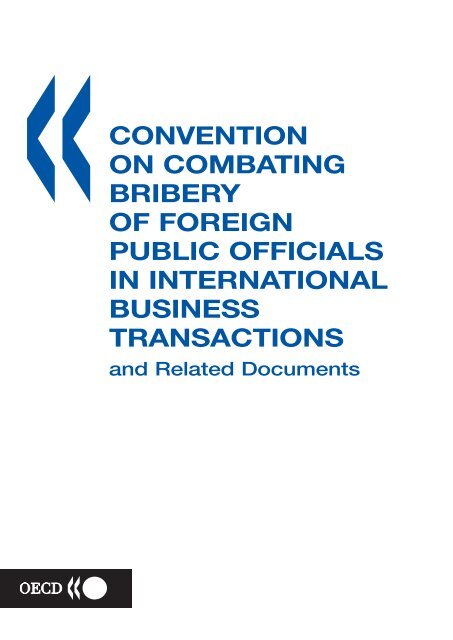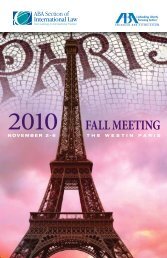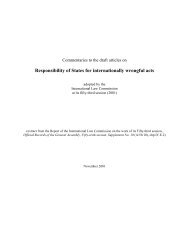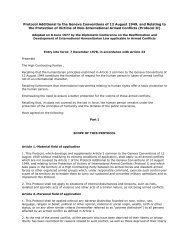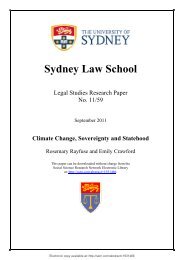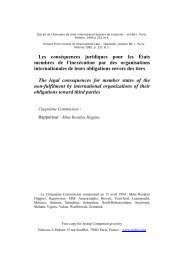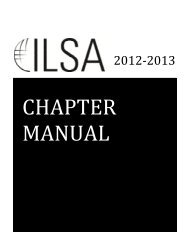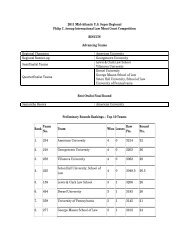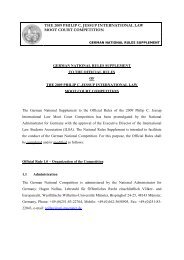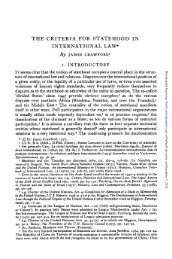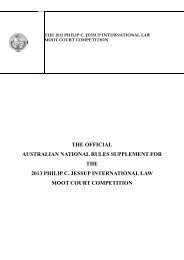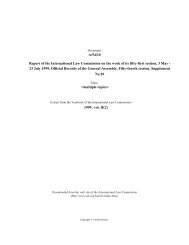convention on combating bribery of foreign public officials
convention on combating bribery of foreign public officials
convention on combating bribery of foreign public officials
Create successful ePaper yourself
Turn your PDF publications into a flip-book with our unique Google optimized e-Paper software.
«<br />
CONVENTION<br />
ON COMBATING<br />
BRIBERY<br />
OF FOREIGN<br />
PUBLIC OFFICIALS<br />
IN INTERNATIONAL<br />
BUSINESS<br />
TRANSACTIONS<br />
and Related Documents
3<br />
Table <strong>of</strong> C<strong>on</strong>tents<br />
C<strong>on</strong>venti<strong>on</strong> <strong>on</strong> Combating Bribery <strong>of</strong> Foreign Public Officials in Internati<strong>on</strong>al Business Transacti<strong>on</strong>s ...... 5<br />
Commentaries <strong>on</strong> the C<strong>on</strong>venti<strong>on</strong> <strong>on</strong> Combating Bribery <strong>of</strong> Foreign Public Officials In Internati<strong>on</strong>al<br />
Business Transacti<strong>on</strong>s ................................................................................................................................. 13<br />
Recommendati<strong>on</strong> <strong>of</strong> the Council for Further Combating Bribery <strong>of</strong> Foreign Public Officials in<br />
Internati<strong>on</strong>al Business Transacti<strong>on</strong>s ............................................................................................................ 19<br />
Recommendati<strong>on</strong> <strong>of</strong> the Council <strong>on</strong> Tax Measures for Further Combating Bribery <strong>of</strong> Foreign Public<br />
Officials in Internati<strong>on</strong>al Business Transacti<strong>on</strong>s ......................................................................................... 32<br />
Recommendati<strong>on</strong> <strong>of</strong> the Council On Bribery and Officially Supported Export Credits ............................. 34<br />
Recommendati<strong>on</strong> <strong>of</strong> the Development Assistance Committee <strong>on</strong> Anti-Corrupti<strong>on</strong> Proposals for Bilateral<br />
Aid Procurement .......................................................................................................................................... 37<br />
OECD Guidelines for Multinati<strong>on</strong>al Enterprises – Secti<strong>on</strong> VI ................................................................... 38<br />
CONVENTION ON COMBATING BRIBERY OF FOREIGN PUBLIC OFFICIALS IN INTERNATIONAL BUSINESS TRANSACTIONS © OECD 2010
CONVENTION - 5<br />
C<strong>on</strong>venti<strong>on</strong> <strong>on</strong> Combating Bribery <strong>of</strong> Foreign Public Officials<br />
in Internati<strong>on</strong>al Business Transacti<strong>on</strong>s<br />
Adopted by the Negotiating C<strong>on</strong>ference <strong>on</strong> 21 November 1997<br />
The Parties,<br />
Preamble<br />
C<strong>on</strong>sidering that <strong>bribery</strong> is a widespread phenomen<strong>on</strong> in internati<strong>on</strong>al business<br />
transacti<strong>on</strong>s, including trade and investment, which raises serious moral and political<br />
c<strong>on</strong>cerns, undermines good governance and ec<strong>on</strong>omic development, and distorts<br />
internati<strong>on</strong>al competitive c<strong>on</strong>diti<strong>on</strong>s;<br />
C<strong>on</strong>sidering that all countries share a resp<strong>on</strong>sibility to combat <strong>bribery</strong> in<br />
internati<strong>on</strong>al business transacti<strong>on</strong>s;<br />
Having regard to the Revised Recommendati<strong>on</strong> <strong>on</strong> Combating Bribery in<br />
Internati<strong>on</strong>al Business Transacti<strong>on</strong>s, adopted by the Council <strong>of</strong> the Organisati<strong>on</strong> for<br />
Ec<strong>on</strong>omic Co-operati<strong>on</strong> and Development (OECD) <strong>on</strong> 23 May 1997, C(97)123/FINAL,<br />
which, inter alia, called for effective measures to deter, prevent and combat the <strong>bribery</strong> <strong>of</strong><br />
<strong>foreign</strong> <strong>public</strong> <strong>of</strong>ficials in c<strong>on</strong>necti<strong>on</strong> with internati<strong>on</strong>al business transacti<strong>on</strong>s, in<br />
particular the prompt criminalisati<strong>on</strong> <strong>of</strong> such <strong>bribery</strong> in an effective and co-ordinated<br />
manner and in c<strong>on</strong>formity with the agreed comm<strong>on</strong> elements set out in that<br />
Recommendati<strong>on</strong> and with the jurisdicti<strong>on</strong>al and other basic legal principles <strong>of</strong> each<br />
country;<br />
Welcoming other recent developments which further advance internati<strong>on</strong>al<br />
understanding and co-operati<strong>on</strong> in <strong>combating</strong> <strong>bribery</strong> <strong>of</strong> <strong>public</strong> <strong>of</strong>ficials, including acti<strong>on</strong>s<br />
<strong>of</strong> the United Nati<strong>on</strong>s, the World Bank, the Internati<strong>on</strong>al M<strong>on</strong>etary Fund, the World<br />
Trade Organisati<strong>on</strong>, the Organisati<strong>on</strong> <strong>of</strong> American States, the Council <strong>of</strong> Europe and the<br />
European Uni<strong>on</strong>;<br />
Welcoming the efforts <strong>of</strong> companies, business organisati<strong>on</strong>s and trade uni<strong>on</strong>s as<br />
well as other n<strong>on</strong>-governmental organisati<strong>on</strong>s to combat <strong>bribery</strong>;<br />
Recognising the role <strong>of</strong> governments in the preventi<strong>on</strong> <strong>of</strong> solicitati<strong>on</strong> <strong>of</strong> bribes<br />
from individuals and enterprises in internati<strong>on</strong>al business transacti<strong>on</strong>s;<br />
Recognising that achieving progress in this field requires not <strong>on</strong>ly efforts <strong>on</strong> a<br />
nati<strong>on</strong>al level but also multilateral co-operati<strong>on</strong>, m<strong>on</strong>itoring and follow-up;<br />
Recognising that achieving equivalence am<strong>on</strong>g the measures to be taken by the<br />
Parties is an essential object and purpose <strong>of</strong> the C<strong>on</strong>venti<strong>on</strong>, which requires that the<br />
C<strong>on</strong>venti<strong>on</strong> be ratified without derogati<strong>on</strong>s affecting this equivalence;<br />
CONVENTION ON COMBATING BRIBERY OF FOREIGN PUBLIC OFFICIALS IN INTERNATIONAL BUSINESS TRANSACTIONS © OECD 2010
6 - CONVENTION<br />
HAVE AGREED AS FOLLOWS:<br />
Article 1<br />
The Offence <strong>of</strong> Bribery <strong>of</strong> Foreign Public Officials<br />
1. Each Party shall take such measures as may be necessary to establish that it is a<br />
criminal <strong>of</strong>fence under its law for any pers<strong>on</strong> intenti<strong>on</strong>ally to <strong>of</strong>fer, promise or give<br />
any undue pecuniary or other advantage, whether directly or through intermediaries,<br />
to a <strong>foreign</strong> <strong>public</strong> <strong>of</strong>ficial, for that <strong>of</strong>ficial or for a third party, in order that the<br />
<strong>of</strong>ficial act or refrain from acting in relati<strong>on</strong> to the performance <strong>of</strong> <strong>of</strong>ficial duties, in<br />
order to obtain or retain business or other improper advantage in the c<strong>on</strong>duct <strong>of</strong><br />
internati<strong>on</strong>al business.<br />
2. Each Party shall take any measures necessary to establish that complicity in,<br />
including incitement, aiding and abetting, or authorisati<strong>on</strong> <strong>of</strong> an act <strong>of</strong> <strong>bribery</strong> <strong>of</strong> a<br />
<strong>foreign</strong> <strong>public</strong> <strong>of</strong>ficial shall be a criminal <strong>of</strong>fence. Attempt and c<strong>on</strong>spiracy to bribe a<br />
<strong>foreign</strong> <strong>public</strong> <strong>of</strong>ficial shall be criminal <strong>of</strong>fences to the same extent as attempt and<br />
c<strong>on</strong>spiracy to bribe a <strong>public</strong> <strong>of</strong>ficial <strong>of</strong> that Party.<br />
3. The <strong>of</strong>fences set out in paragraphs 1 and 2 above are hereinafter referred to as<br />
“<strong>bribery</strong> <strong>of</strong> a <strong>foreign</strong> <strong>public</strong> <strong>of</strong>ficial”.<br />
4. For the purpose <strong>of</strong> this C<strong>on</strong>venti<strong>on</strong>:<br />
a) “<strong>foreign</strong> <strong>public</strong> <strong>of</strong>ficial” means any pers<strong>on</strong> holding a legislative, administrative<br />
or judicial <strong>of</strong>fice <strong>of</strong> a <strong>foreign</strong> country, whether appointed or elected; any pers<strong>on</strong><br />
exercising a <strong>public</strong> functi<strong>on</strong> for a <strong>foreign</strong> country, including for a <strong>public</strong><br />
agency or <strong>public</strong> enterprise; and any <strong>of</strong>ficial or agent <strong>of</strong> a <strong>public</strong> internati<strong>on</strong>al<br />
organisati<strong>on</strong>;<br />
b) “<strong>foreign</strong> country” includes all levels and subdivisi<strong>on</strong>s <strong>of</strong> government, from<br />
nati<strong>on</strong>al to local;<br />
c) “act or refrain from acting in relati<strong>on</strong> to the performance <strong>of</strong> <strong>of</strong>ficial duties”<br />
includes any use <strong>of</strong> the <strong>public</strong> <strong>of</strong>ficial’s positi<strong>on</strong>, whether or not within the<br />
<strong>of</strong>ficial’s authorised competence.<br />
Article 2<br />
Resp<strong>on</strong>sibility <strong>of</strong> Legal Pers<strong>on</strong>s<br />
Each Party shall take such measures as may be necessary, in accordance with its legal<br />
principles, to establish the liability <strong>of</strong> legal pers<strong>on</strong>s for the <strong>bribery</strong> <strong>of</strong> a <strong>foreign</strong> <strong>public</strong><br />
<strong>of</strong>ficial.<br />
CONVENTION ON COMBATING BRIBERY OF FOREIGN PUBLIC OFFICIALS IN INTERNATIONAL BUSINESS TRANSACTIONS © OECD 2010
CONVENTION - 7<br />
Article 3<br />
Sancti<strong>on</strong>s<br />
1. The <strong>bribery</strong> <strong>of</strong> a <strong>foreign</strong> <strong>public</strong> <strong>of</strong>ficial shall be punishable by effective,<br />
proporti<strong>on</strong>ate and dissuasive criminal penalties. The range <strong>of</strong> penalties shall be<br />
comparable to that applicable to the <strong>bribery</strong> <strong>of</strong> the Party’s own <strong>public</strong> <strong>of</strong>ficials and<br />
shall, in the case <strong>of</strong> natural pers<strong>on</strong>s, include deprivati<strong>on</strong> <strong>of</strong> liberty sufficient to<br />
enable effective mutual legal assistance and extraditi<strong>on</strong>.<br />
2. In the event that, under the legal system <strong>of</strong> a Party, criminal resp<strong>on</strong>sibility is not<br />
applicable to legal pers<strong>on</strong>s, that Party shall ensure that legal pers<strong>on</strong>s shall be subject<br />
to effective, proporti<strong>on</strong>ate and dissuasive n<strong>on</strong>-criminal sancti<strong>on</strong>s, including<br />
m<strong>on</strong>etary sancti<strong>on</strong>s, for <strong>bribery</strong> <strong>of</strong> <strong>foreign</strong> <strong>public</strong> <strong>of</strong>ficials.<br />
3. Each Party shall take such measures as may be necessary to provide that the bribe<br />
and the proceeds <strong>of</strong> the <strong>bribery</strong> <strong>of</strong> a <strong>foreign</strong> <strong>public</strong> <strong>of</strong>ficial, or property the value <strong>of</strong><br />
which corresp<strong>on</strong>ds to that <strong>of</strong> such proceeds, are subject to seizure and c<strong>on</strong>fiscati<strong>on</strong><br />
or that m<strong>on</strong>etary sancti<strong>on</strong>s <strong>of</strong> comparable effect are applicable.<br />
4. Each Party shall c<strong>on</strong>sider the impositi<strong>on</strong> <strong>of</strong> additi<strong>on</strong>al civil or administrative<br />
sancti<strong>on</strong>s up<strong>on</strong> a pers<strong>on</strong> subject to sancti<strong>on</strong>s for the <strong>bribery</strong> <strong>of</strong> a <strong>foreign</strong> <strong>public</strong><br />
<strong>of</strong>ficial.<br />
Article 4<br />
Jurisdicti<strong>on</strong><br />
1. Each Party shall take such measures as may be necessary to establish its jurisdicti<strong>on</strong><br />
over the <strong>bribery</strong> <strong>of</strong> a <strong>foreign</strong> <strong>public</strong> <strong>of</strong>ficial when the <strong>of</strong>fence is committed in whole<br />
or in part in its territory.<br />
2. Each Party which has jurisdicti<strong>on</strong> to prosecute its nati<strong>on</strong>als for <strong>of</strong>fences committed<br />
abroad shall take such measures as may be necessary to establish its jurisdicti<strong>on</strong> to<br />
do so in respect <strong>of</strong> the <strong>bribery</strong> <strong>of</strong> a <strong>foreign</strong> <strong>public</strong> <strong>of</strong>ficial, according to the same<br />
principles.<br />
3. When more than <strong>on</strong>e Party has jurisdicti<strong>on</strong> over an alleged <strong>of</strong>fence described in this<br />
C<strong>on</strong>venti<strong>on</strong>, the Parties involved shall, at the request <strong>of</strong> <strong>on</strong>e <strong>of</strong> them, c<strong>on</strong>sult with a<br />
view to determining the most appropriate jurisdicti<strong>on</strong> for prosecuti<strong>on</strong>.<br />
4. Each Party shall review whether its current basis for jurisdicti<strong>on</strong> is effective in the<br />
fight against the <strong>bribery</strong> <strong>of</strong> <strong>foreign</strong> <strong>public</strong> <strong>of</strong>ficials and, if it is not, shall take<br />
remedial steps.<br />
CONVENTION ON COMBATING BRIBERY OF FOREIGN PUBLIC OFFICIALS IN INTERNATIONAL BUSINESS TRANSACTIONS © OECD 2010
8 - CONVENTION<br />
Article 5<br />
Enforcement<br />
Investigati<strong>on</strong> and prosecuti<strong>on</strong> <strong>of</strong> the <strong>bribery</strong> <strong>of</strong> a <strong>foreign</strong> <strong>public</strong> <strong>of</strong>ficial shall be subject to<br />
the applicable rules and principles <strong>of</strong> each Party. They shall not be influenced by<br />
c<strong>on</strong>siderati<strong>on</strong>s <strong>of</strong> nati<strong>on</strong>al ec<strong>on</strong>omic interest, the potential effect up<strong>on</strong> relati<strong>on</strong>s with<br />
another State or the identity <strong>of</strong> the natural or legal pers<strong>on</strong>s involved.<br />
Article 6<br />
Statute <strong>of</strong> Limitati<strong>on</strong>s<br />
Any statute <strong>of</strong> limitati<strong>on</strong>s applicable to the <strong>of</strong>fence <strong>of</strong> <strong>bribery</strong> <strong>of</strong> a <strong>foreign</strong> <strong>public</strong> <strong>of</strong>ficial<br />
shall allow an adequate period <strong>of</strong> time for the investigati<strong>on</strong> and prosecuti<strong>on</strong> <strong>of</strong> this<br />
<strong>of</strong>fence.<br />
Article 7<br />
M<strong>on</strong>ey Laundering<br />
Each Party which has made <strong>bribery</strong> <strong>of</strong> its own <strong>public</strong> <strong>of</strong>ficial a predicate <strong>of</strong>fence for the<br />
purpose <strong>of</strong> the applicati<strong>on</strong> <strong>of</strong> its m<strong>on</strong>ey laundering legislati<strong>on</strong> shall do so <strong>on</strong> the same<br />
terms for the <strong>bribery</strong> <strong>of</strong> a <strong>foreign</strong> <strong>public</strong> <strong>of</strong>ficial, without regard to the place where the<br />
<strong>bribery</strong> occurred.<br />
Article 8<br />
Accounting<br />
1. In order to combat <strong>bribery</strong> <strong>of</strong> <strong>foreign</strong> <strong>public</strong> <strong>of</strong>ficials effectively, each Party shall<br />
take such measures as may be necessary, within the framework <strong>of</strong> its laws and<br />
regulati<strong>on</strong>s regarding the maintenance <strong>of</strong> books and records, financial statement<br />
disclosures, and accounting and auditing standards, to prohibit the establishment <strong>of</strong><br />
<strong>of</strong>f-the-books accounts, the making <strong>of</strong> <strong>of</strong>f-the-books or inadequately identified<br />
transacti<strong>on</strong>s, the recording <strong>of</strong> n<strong>on</strong>-existent expenditures, the entry <strong>of</strong> liabilities with<br />
incorrect identificati<strong>on</strong> <strong>of</strong> their object, as well as the use <strong>of</strong> false documents, by<br />
companies subject to those laws and regulati<strong>on</strong>s, for the purpose <strong>of</strong> bribing <strong>foreign</strong><br />
<strong>public</strong> <strong>of</strong>ficials or <strong>of</strong> hiding such <strong>bribery</strong>.<br />
2. Each Party shall provide effective, proporti<strong>on</strong>ate and dissuasive civil, administrative<br />
or criminal penalties for such omissi<strong>on</strong>s and falsificati<strong>on</strong>s in respect <strong>of</strong> the books,<br />
records, accounts and financial statements <strong>of</strong> such companies.<br />
CONVENTION ON COMBATING BRIBERY OF FOREIGN PUBLIC OFFICIALS IN INTERNATIONAL BUSINESS TRANSACTIONS © OECD 2010
CONVENTION - 9<br />
Article 9<br />
Mutual Legal Assistance<br />
1. Each Party shall, to the fullest extent possible under its laws and relevant treaties<br />
and arrangements, provide prompt and effective legal assistance to another Party for<br />
the purpose <strong>of</strong> criminal investigati<strong>on</strong>s and proceedings brought by a Party<br />
c<strong>on</strong>cerning <strong>of</strong>fences within the scope <strong>of</strong> this C<strong>on</strong>venti<strong>on</strong> and for n<strong>on</strong>-criminal<br />
proceedings within the scope <strong>of</strong> this C<strong>on</strong>venti<strong>on</strong> brought by a Party against a legal<br />
pers<strong>on</strong>. The requested Party shall inform the requesting Party, without delay, <strong>of</strong> any<br />
additi<strong>on</strong>al informati<strong>on</strong> or documents needed to support the request for assistance<br />
and, where requested, <strong>of</strong> the status and outcome <strong>of</strong> the request for assistance.<br />
2. Where a Party makes mutual legal assistance c<strong>on</strong>diti<strong>on</strong>al up<strong>on</strong> the existence <strong>of</strong> dual<br />
criminality, dual criminality shall be deemed to exist if the <strong>of</strong>fence for which the<br />
assistance is sought is within the scope <strong>of</strong> this C<strong>on</strong>venti<strong>on</strong>.<br />
3. A Party shall not decline to render mutual legal assistance for criminal matters<br />
within the scope <strong>of</strong> this C<strong>on</strong>venti<strong>on</strong> <strong>on</strong> the ground <strong>of</strong> bank secrecy.<br />
Article 10<br />
Extraditi<strong>on</strong><br />
1. Bribery <strong>of</strong> a <strong>foreign</strong> <strong>public</strong> <strong>of</strong>ficial shall be deemed to be included as an extraditable<br />
<strong>of</strong>fence under the laws <strong>of</strong> the Parties and the extraditi<strong>on</strong> treaties between them.<br />
2. If a Party which makes extraditi<strong>on</strong> c<strong>on</strong>diti<strong>on</strong>al <strong>on</strong> the existence <strong>of</strong> an extraditi<strong>on</strong><br />
treaty receives a request for extraditi<strong>on</strong> from another Party with which it has no<br />
extraditi<strong>on</strong> treaty, it may c<strong>on</strong>sider this C<strong>on</strong>venti<strong>on</strong> to be the legal basis for<br />
extraditi<strong>on</strong> in respect <strong>of</strong> the <strong>of</strong>fence <strong>of</strong> <strong>bribery</strong> <strong>of</strong> a <strong>foreign</strong> <strong>public</strong> <strong>of</strong>ficial.<br />
3. Each Party shall take any measures necessary to assure either that it can extradite its<br />
nati<strong>on</strong>als or that it can prosecute its nati<strong>on</strong>als for the <strong>of</strong>fence <strong>of</strong> <strong>bribery</strong> <strong>of</strong> a <strong>foreign</strong><br />
<strong>public</strong> <strong>of</strong>ficial. A Party which declines a request to extradite a pers<strong>on</strong> for <strong>bribery</strong> <strong>of</strong><br />
a <strong>foreign</strong> <strong>public</strong> <strong>of</strong>ficial solely <strong>on</strong> the ground that the pers<strong>on</strong> is its nati<strong>on</strong>al shall<br />
submit the case to its competent authorities for the purpose <strong>of</strong> prosecuti<strong>on</strong>.<br />
4. Extraditi<strong>on</strong> for <strong>bribery</strong> <strong>of</strong> a <strong>foreign</strong> <strong>public</strong> <strong>of</strong>ficial is subject to the c<strong>on</strong>diti<strong>on</strong>s set out<br />
in the domestic law and applicable treaties and arrangements <strong>of</strong> each Party. Where a<br />
Party makes extraditi<strong>on</strong> c<strong>on</strong>diti<strong>on</strong>al up<strong>on</strong> the existence <strong>of</strong> dual criminality, that<br />
c<strong>on</strong>diti<strong>on</strong> shall be deemed to be fulfilled if the <strong>of</strong>fence for which extraditi<strong>on</strong> is<br />
sought is within the scope <strong>of</strong> Article 1 <strong>of</strong> this C<strong>on</strong>venti<strong>on</strong>.<br />
CONVENTION ON COMBATING BRIBERY OF FOREIGN PUBLIC OFFICIALS IN INTERNATIONAL BUSINESS TRANSACTIONS © OECD 2010
10 - CONVENTION<br />
Article 11<br />
Resp<strong>on</strong>sible Authorities<br />
For the purposes <strong>of</strong> Article 4, paragraph 3, <strong>on</strong> c<strong>on</strong>sultati<strong>on</strong>, Article 9, <strong>on</strong> mutual legal<br />
assistance and Article 10, <strong>on</strong> extraditi<strong>on</strong>, each Party shall notify to the Secretary-General<br />
<strong>of</strong> the OECD an authority or authorities resp<strong>on</strong>sible for making and receiving requests,<br />
which shall serve as channel <strong>of</strong> communicati<strong>on</strong> for these matters for that Party, without<br />
prejudice to other arrangements between Parties.<br />
Article 12<br />
M<strong>on</strong>itoring and Follow-up<br />
The Parties shall co-operate in carrying out a programme <strong>of</strong> systematic follow-up to<br />
m<strong>on</strong>itor and promote the full implementati<strong>on</strong> <strong>of</strong> this C<strong>on</strong>venti<strong>on</strong>. Unless otherwise<br />
decided by c<strong>on</strong>sensus <strong>of</strong> the Parties, this shall be d<strong>on</strong>e in the framework <strong>of</strong> the OECD<br />
Working Group <strong>on</strong> Bribery in Internati<strong>on</strong>al Business Transacti<strong>on</strong>s and according to its<br />
terms <strong>of</strong> reference, or within the framework and terms <strong>of</strong> reference <strong>of</strong> any successor to its<br />
functi<strong>on</strong>s, and Parties shall bear the costs <strong>of</strong> the programme in accordance with the rules<br />
applicable to that body.<br />
Article 13<br />
Signature and Accessi<strong>on</strong><br />
1. Until its entry into force, this C<strong>on</strong>venti<strong>on</strong> shall be open for signature by OECD<br />
Members and by N<strong>on</strong>-Members which have been invited to become full participants<br />
in its Working Group <strong>on</strong> Bribery in Internati<strong>on</strong>al Business Transacti<strong>on</strong>s.<br />
2. Subsequent to its entry into force, this C<strong>on</strong>venti<strong>on</strong> shall be open to accessi<strong>on</strong> by any<br />
n<strong>on</strong>-signatory which is a member <strong>of</strong> the OECD or has become a full participant in<br />
the Working Group <strong>on</strong> Bribery in Internati<strong>on</strong>al Business Transacti<strong>on</strong>s or any<br />
successor to its functi<strong>on</strong>s. For each such n<strong>on</strong>-signatory, the C<strong>on</strong>venti<strong>on</strong> shall enter<br />
into force <strong>on</strong> the sixtieth day following the date <strong>of</strong> deposit <strong>of</strong> its instrument <strong>of</strong><br />
accessi<strong>on</strong>.<br />
Article 14<br />
Ratificati<strong>on</strong> and Depositary<br />
1. This C<strong>on</strong>venti<strong>on</strong> is subject to acceptance, approval or ratificati<strong>on</strong> by the<br />
Signatories, in accordance with their respective laws.<br />
2. Instruments <strong>of</strong> acceptance, approval, ratificati<strong>on</strong> or accessi<strong>on</strong> shall be deposited<br />
with the Secretary-General <strong>of</strong> the OECD, who shall serve as Depositary <strong>of</strong> this<br />
C<strong>on</strong>venti<strong>on</strong>.<br />
CONVENTION ON COMBATING BRIBERY OF FOREIGN PUBLIC OFFICIALS IN INTERNATIONAL BUSINESS TRANSACTIONS © OECD 2010
CONVENTION - 11<br />
Article 15<br />
Entry into Force<br />
1. This C<strong>on</strong>venti<strong>on</strong> shall enter into force <strong>on</strong> the sixtieth day following the date up<strong>on</strong><br />
which five <strong>of</strong> the ten countries which have the ten largest export shares set out in<br />
DAFFE/IME/BR(97)18/FINAL (annexed), and which represent by themselves at<br />
least sixty per cent <strong>of</strong> the combined total exports <strong>of</strong> those ten countries, have<br />
deposited their instruments <strong>of</strong> acceptance, approval, or ratificati<strong>on</strong>. For each<br />
signatory depositing its instrument after such entry into force, the C<strong>on</strong>venti<strong>on</strong> shall<br />
enter into force <strong>on</strong> the sixtieth day after deposit <strong>of</strong> its instrument.<br />
2. If, after 31 December 1998, the C<strong>on</strong>venti<strong>on</strong> has not entered into force under<br />
paragraph 1 above, any signatory which has deposited its instrument <strong>of</strong> acceptance,<br />
approval or ratificati<strong>on</strong> may declare in writing to the Depositary its readiness to<br />
accept entry into force <strong>of</strong> this C<strong>on</strong>venti<strong>on</strong> under this paragraph 2. The C<strong>on</strong>venti<strong>on</strong><br />
shall enter into force for such a signatory <strong>on</strong> the sixtieth day following the date<br />
up<strong>on</strong> which such declarati<strong>on</strong>s have been deposited by at least two signatories. For<br />
each signatory depositing its declarati<strong>on</strong> after such entry into force, the C<strong>on</strong>venti<strong>on</strong><br />
shall enter into force <strong>on</strong> the sixtieth day following the date <strong>of</strong> deposit.<br />
Article 16<br />
Amendment<br />
Any Party may propose the amendment <strong>of</strong> this C<strong>on</strong>venti<strong>on</strong>. A proposed amendment shall<br />
be submitted to the Depositary which shall communicate it to the other Parties at least<br />
sixty days before c<strong>on</strong>vening a meeting <strong>of</strong> the Parties to c<strong>on</strong>sider the proposed<br />
amendment. An amendment adopted by c<strong>on</strong>sensus <strong>of</strong> the Parties, or by such other means<br />
as the Parties may determine by c<strong>on</strong>sensus, shall enter into force sixty days after the<br />
deposit <strong>of</strong> an instrument <strong>of</strong> ratificati<strong>on</strong>, acceptance or approval by all <strong>of</strong> the Parties, or in<br />
such other circumstances as may be specified by the Parties at the time <strong>of</strong> adopti<strong>on</strong> <strong>of</strong> the<br />
amendment.<br />
Article 17<br />
Withdrawal<br />
A Party may withdraw from this C<strong>on</strong>venti<strong>on</strong> by submitting written notificati<strong>on</strong> to the<br />
Depositary. Such withdrawal shall be effective <strong>on</strong>e year after the date <strong>of</strong> the receipt <strong>of</strong> the<br />
notificati<strong>on</strong>. After withdrawal, co-operati<strong>on</strong> shall c<strong>on</strong>tinue between the Parties and the Party<br />
which has withdrawn <strong>on</strong> all requests for assistance or extraditi<strong>on</strong> made before the effective date<br />
<strong>of</strong> withdrawal which remain pending.<br />
CONVENTION ON COMBATING BRIBERY OF FOREIGN PUBLIC OFFICIALS IN INTERNATIONAL BUSINESS TRANSACTIONS © OECD 2010
12 - CONVENTION<br />
Annex<br />
Statistics <strong>on</strong> OECD Exports<br />
1990-1996 1990-1996 1990-1996<br />
US$ milli<strong>on</strong><br />
% <strong>of</strong> Total OCDE % <strong>of</strong> 10 largest<br />
United States 287 118 15.9% 19.7%<br />
Germany 254 746 14.1% 17.5%<br />
Japan 212 665 11.8% 14.6%<br />
France 138 471 7.7% 9.5%<br />
United Kingdom 121 258 6.7% 8.3%<br />
Italy 112 449 6.2% 7.7%<br />
Canada 91 215 5.1% 6.3%<br />
Korea (1) 81 364 4.5% 5.6%<br />
Netherlands 81 264 4.5% 5.6%<br />
Belgium-Luxembourg 78 598 4.4% 5.4%<br />
Total 10 largest 1 459 148 81.0% 100%<br />
Spain 42 469 2.4%<br />
Switzerland 40 395 2.2%<br />
Sweden 36 710 2.0%<br />
Mexico (1) 34 233 1.9%<br />
Australia 27 194 1.5%<br />
Denmark 24 145 1.3%<br />
Austria* 22 432 1.2%<br />
Norway 21 666 1.2%<br />
Ireland 19 217 1.1%<br />
Finland 17 296 1.0%<br />
Poland (1) ** 12 652 0.7%<br />
Portugal 10 801 0.6%<br />
Turkey * 8 027 0.4%<br />
Hungary ** 6 795 0.4%<br />
New Zealand 6 663 0.4%<br />
Czech Re<strong>public</strong> *** 6 263 0.3%<br />
Greece * 4 606 0.3%<br />
Iceland 949 0.1%<br />
Total OCDE 1 801 661 100%<br />
Notes: * 1990-1995; ** 1991-1996; *** 1993-1996<br />
Source: OECD, (1) IMF<br />
C<strong>on</strong>cerning Belgium-Luxembourg: Trade statistics for Belgium and Luxembourg are available <strong>on</strong>ly <strong>on</strong> a<br />
combined basis for the two countries. For purposes <strong>of</strong> Article 15, paragraph 1 <strong>of</strong> the C<strong>on</strong>venti<strong>on</strong>, if either<br />
Belgium or Luxembourg deposits its instrument <strong>of</strong> acceptance, approval or ratificati<strong>on</strong>, or if both Belgium and<br />
Luxembourg deposit their instruments <strong>of</strong> acceptance, approval or ratificati<strong>on</strong>, it shall be c<strong>on</strong>sidered that <strong>on</strong>e <strong>of</strong><br />
the countries which have the ten largest exports shares has deposited its instrument and the joint exports <strong>of</strong> both<br />
countries will be counted towards the 60 per cent <strong>of</strong> combined total exports <strong>of</strong> those ten countries, which is<br />
required for entry into force under this provisi<strong>on</strong>.<br />
CONVENTION ON COMBATING BRIBERY OF FOREIGN PUBLIC OFFICIALS IN INTERNATIONAL BUSINESS TRANSACTIONS © OECD 2010
COMMENTARIES ON THE CONVENTION - 13<br />
Commentaries <strong>on</strong> the C<strong>on</strong>venti<strong>on</strong> <strong>on</strong> Combating Bribery <strong>of</strong> Foreign<br />
Public Officials in Internati<strong>on</strong>al Business Transacti<strong>on</strong>s<br />
Adopted by the Negotiating C<strong>on</strong>ference <strong>on</strong> 21 November 1997<br />
General:<br />
1. This C<strong>on</strong>venti<strong>on</strong> deals with what, in the law <strong>of</strong> some countries, is called “active<br />
corrupti<strong>on</strong>” or “active <strong>bribery</strong>”, meaning the <strong>of</strong>fence committed by the pers<strong>on</strong> who<br />
promises or gives the bribe, as c<strong>on</strong>trasted with “passive <strong>bribery</strong>”, the <strong>of</strong>fence committed<br />
by the <strong>of</strong>ficial who receives the bribe. The C<strong>on</strong>venti<strong>on</strong> does not utilise the term “active<br />
<strong>bribery</strong>” simply to avoid it being misread by the n<strong>on</strong>-technical reader as implying that the<br />
briber has taken the initiative and the recipient is a passive victim. In fact, in a number <strong>of</strong><br />
situati<strong>on</strong>s, the recipient will have induced or pressured the briber and will have been, in<br />
that sense, the more active.<br />
2. This C<strong>on</strong>venti<strong>on</strong> seeks to assure a functi<strong>on</strong>al equivalence am<strong>on</strong>g the measures<br />
taken by the Parties to sancti<strong>on</strong> <strong>bribery</strong> <strong>of</strong> <strong>foreign</strong> <strong>public</strong> <strong>of</strong>ficials, without requiring<br />
uniformity or changes in fundamental principles <strong>of</strong> a Party’s legal system.<br />
Article 1. The Offence <strong>of</strong> Bribery <strong>of</strong> Foreign Public Officials:<br />
Re paragraph 1:<br />
3. Article 1 establishes a standard to be met by Parties, but does not require them to<br />
utilise its precise terms in defining the <strong>of</strong>fence under their domestic laws. A Party may<br />
use various approaches to fulfil its obligati<strong>on</strong>s, provided that c<strong>on</strong>victi<strong>on</strong> <strong>of</strong> a pers<strong>on</strong> for<br />
the <strong>of</strong>fence does not require pro<strong>of</strong> <strong>of</strong> elements bey<strong>on</strong>d those which would be required to<br />
be proved if the <strong>of</strong>fence were defined as in this paragraph. For example, a statute<br />
prohibiting the <strong>bribery</strong> <strong>of</strong> agents generally which does not specifically address <strong>bribery</strong> <strong>of</strong><br />
a <strong>foreign</strong> <strong>public</strong> <strong>of</strong>ficial, and a statute specifically limited to this case, could both comply<br />
with this Article. Similarly, a statute which defined the <strong>of</strong>fence in terms <strong>of</strong> payments “to<br />
induce a breach <strong>of</strong> the <strong>of</strong>ficial’s duty” could meet the standard provided that it was<br />
understood that every <strong>public</strong> <strong>of</strong>ficial had a duty to exercise judgement or discreti<strong>on</strong><br />
impartially and this was an “aut<strong>on</strong>omous” definiti<strong>on</strong> not requiring pro<strong>of</strong> <strong>of</strong> the law <strong>of</strong> the<br />
particular <strong>of</strong>ficial’s country.<br />
4. It is an <strong>of</strong>fence within the meaning <strong>of</strong> paragraph 1 to bribe to obtain or retain<br />
business or other improper advantage whether or not the company c<strong>on</strong>cerned was the best<br />
qualified bidder or was otherwise a company which could properly have been awarded<br />
the business.<br />
5. “Other improper advantage” refers to something to which the company c<strong>on</strong>cerned<br />
was not clearly entitled, for example, an operating permit for a factory which fails to meet<br />
the statutory requirements.<br />
6. The c<strong>on</strong>duct described in paragraph 1 is an <strong>of</strong>fence whether the <strong>of</strong>fer or promise<br />
is made or the pecuniary or other advantage is given <strong>on</strong> that pers<strong>on</strong>’s own behalf or <strong>on</strong><br />
behalf <strong>of</strong> any other natural pers<strong>on</strong> or legal entity.<br />
CONVENTION ON COMBATING BRIBERY OF FOREIGN PUBLIC OFFICIALS IN INTERNATIONAL BUSINESS TRANSACTIONS © OECD 2010
14 - COMMENTARIES ON THE CONVENTION<br />
7. It is also an <strong>of</strong>fence irrespective <strong>of</strong>, inter alia, the value <strong>of</strong> the advantage, its<br />
results, percepti<strong>on</strong>s <strong>of</strong> local custom, the tolerance <strong>of</strong> such payments by local authorities,<br />
or the alleged necessity <strong>of</strong> the payment in order to obtain or retain business or other<br />
improper advantage.<br />
8. It is not an <strong>of</strong>fence, however, if the advantage was permitted or required by the<br />
written law or regulati<strong>on</strong> <strong>of</strong> the <strong>foreign</strong> <strong>public</strong> <strong>of</strong>ficial’s country, including case law.<br />
9. Small “facilitati<strong>on</strong>” payments do not c<strong>on</strong>stitute payments made “to obtain or<br />
retain business or other improper advantage” within the meaning <strong>of</strong> paragraph 1 and,<br />
accordingly, are also not an <strong>of</strong>fence. Such payments, which, in some countries, are made<br />
to induce <strong>public</strong> <strong>of</strong>ficials to perform their functi<strong>on</strong>s, such as issuing licenses or permits,<br />
are generally illegal in the <strong>foreign</strong> country c<strong>on</strong>cerned. Other countries can and should<br />
address this corrosive phenomen<strong>on</strong> by such means as support for programmes <strong>of</strong> good<br />
governance. However, criminalisati<strong>on</strong> by other countries does not seem a practical or<br />
effective complementary acti<strong>on</strong>.<br />
10. Under the legal system <strong>of</strong> some countries, an advantage promised or given to any<br />
pers<strong>on</strong>, in anticipati<strong>on</strong> <strong>of</strong> his or her becoming a <strong>foreign</strong> <strong>public</strong> <strong>of</strong>ficial, falls within the<br />
scope <strong>of</strong> the <strong>of</strong>fences described in Article 1, paragraph 1 or 2. Under the legal system <strong>of</strong><br />
many countries, it is c<strong>on</strong>sidered technically distinct from the <strong>of</strong>fences covered by the<br />
present C<strong>on</strong>venti<strong>on</strong>. However, there is a comm<strong>on</strong>ly shared c<strong>on</strong>cern and intent to address<br />
this phenomen<strong>on</strong> through further work.<br />
Re paragraph 2:<br />
11. The <strong>of</strong>fences set out in paragraph 2 are understood in terms <strong>of</strong> their normal<br />
c<strong>on</strong>tent in nati<strong>on</strong>al legal systems. Accordingly, if authorisati<strong>on</strong>, incitement, or <strong>on</strong>e <strong>of</strong> the<br />
other listed acts, which does not lead to further acti<strong>on</strong>, is not itself punishable under a<br />
Party’s legal system, then the Party would not be required to make it punishable with<br />
respect to <strong>bribery</strong> <strong>of</strong> a <strong>foreign</strong> <strong>public</strong> <strong>of</strong>ficial.<br />
Re paragraph 4:<br />
12. “Public functi<strong>on</strong>” includes any activity in the <strong>public</strong> interest, delegated by a<br />
<strong>foreign</strong> country, such as the performance <strong>of</strong> a task delegated by it in c<strong>on</strong>necti<strong>on</strong> with<br />
<strong>public</strong> procurement.<br />
13. A “<strong>public</strong> agency” is an entity c<strong>on</strong>stituted under <strong>public</strong> law to carry out specific<br />
tasks in the <strong>public</strong> interest.<br />
14. A “<strong>public</strong> enterprise” is any enterprise, regardless <strong>of</strong> its legal form, over which a<br />
government, or governments, may, directly or indirectly, exercise a dominant influence.<br />
This is deemed to be the case, inter alia, when the government or governments hold the<br />
majority <strong>of</strong> the enterprise’s subscribed capital, c<strong>on</strong>trol the majority <strong>of</strong> votes attaching to<br />
shares issued by the enterprise or can appoint a majority <strong>of</strong> the members <strong>of</strong> the<br />
enterprise’s administrative or managerial body or supervisory board.<br />
15. An <strong>of</strong>ficial <strong>of</strong> a <strong>public</strong> enterprise shall be deemed to perform a <strong>public</strong> functi<strong>on</strong><br />
unless the enterprise operates <strong>on</strong> a normal commercial basis in the relevant market, i.e.,<br />
<strong>on</strong> a basis which is substantially equivalent to that <strong>of</strong> a private enterprise, without<br />
preferential subsidies or other privileges.<br />
16. In special circumstances, <strong>public</strong> authority may in fact be held by pers<strong>on</strong>s (e.g.,<br />
political party <strong>of</strong>ficials in single party states) not formally designated as <strong>public</strong> <strong>of</strong>ficials.<br />
CONVENTION ON COMBATING BRIBERY OF FOREIGN PUBLIC OFFICIALS IN INTERNATIONAL BUSINESS TRANSACTIONS © OECD 2010
COMMENTARIES ON THE CONVENTION - 15<br />
Such pers<strong>on</strong>s, through their de facto performance <strong>of</strong> a <strong>public</strong> functi<strong>on</strong>, may, under the<br />
legal principles <strong>of</strong> some countries, be c<strong>on</strong>sidered to be <strong>foreign</strong> <strong>public</strong> <strong>of</strong>ficials.<br />
17. “Public internati<strong>on</strong>al organisati<strong>on</strong>” includes any internati<strong>on</strong>al organisati<strong>on</strong><br />
formed by states, governments, or other <strong>public</strong> internati<strong>on</strong>al organisati<strong>on</strong>s, whatever the<br />
form <strong>of</strong> organisati<strong>on</strong> and scope <strong>of</strong> competence, including, for example, a regi<strong>on</strong>al<br />
ec<strong>on</strong>omic integrati<strong>on</strong> organisati<strong>on</strong> such as the European Communities.<br />
18. “Foreign country” is not limited to states, but includes any organised <strong>foreign</strong> area<br />
or entity, such as an aut<strong>on</strong>omous territory or a separate customs territory.<br />
19. One case <strong>of</strong> <strong>bribery</strong> which has been c<strong>on</strong>templated under the definiti<strong>on</strong> in<br />
paragraph 4.c is where an executive <strong>of</strong> a company gives a bribe to a senior <strong>of</strong>ficial <strong>of</strong> a<br />
government, in order that this <strong>of</strong>ficial use his <strong>of</strong>fice – though acting outside his<br />
competence – to make another <strong>of</strong>ficial award a c<strong>on</strong>tract to that company.<br />
Article 2. Resp<strong>on</strong>sibility <strong>of</strong> Legal Pers<strong>on</strong>s:<br />
20. In the event that, under the legal system <strong>of</strong> a Party, criminal resp<strong>on</strong>sibility is not<br />
applicable to legal pers<strong>on</strong>s, that Party shall not be required to establish such criminal<br />
resp<strong>on</strong>sibility.<br />
Article 3. Sancti<strong>on</strong>s:<br />
Re paragraph 3:<br />
21. The “proceeds” <strong>of</strong> <strong>bribery</strong> are the pr<strong>of</strong>its or other benefits derived by the briber<br />
from the transacti<strong>on</strong> or other improper advantage obtained or retained through <strong>bribery</strong>.<br />
22. The term “c<strong>on</strong>fiscati<strong>on</strong>” includes forfeiture where applicable and means the<br />
permanent deprivati<strong>on</strong> <strong>of</strong> property by order <strong>of</strong> a court or other competent authority. This<br />
paragraph is without prejudice to rights <strong>of</strong> victims.<br />
23. Paragraph 3 does not preclude setting appropriate limits to m<strong>on</strong>etary sancti<strong>on</strong>s.<br />
Re paragraph 4:<br />
24. Am<strong>on</strong>g the civil or administrative sancti<strong>on</strong>s, other than n<strong>on</strong>-criminal fines, which<br />
might be imposed up<strong>on</strong> legal pers<strong>on</strong>s for an act <strong>of</strong> <strong>bribery</strong> <strong>of</strong> a <strong>foreign</strong> <strong>public</strong> <strong>of</strong>ficial are:<br />
exclusi<strong>on</strong> from entitlement to <strong>public</strong> benefits or aid; temporary or permanent<br />
disqualificati<strong>on</strong> from participati<strong>on</strong> in <strong>public</strong> procurement or from the practice <strong>of</strong> other<br />
commercial activities; placing under judicial supervisi<strong>on</strong>; and a judicial winding-up order.<br />
Article 4. Jurisdicti<strong>on</strong>:<br />
Re paragraph 1:<br />
25. The territorial basis for jurisdicti<strong>on</strong> should be interpreted broadly so that an<br />
extensive physical c<strong>on</strong>necti<strong>on</strong> to the <strong>bribery</strong> act is not required.<br />
Re paragraph 2:<br />
26. Nati<strong>on</strong>ality jurisdicti<strong>on</strong> is to be established according to the general principles and<br />
c<strong>on</strong>diti<strong>on</strong>s in the legal system <strong>of</strong> each Party. These principles deal with such matters as<br />
CONVENTION ON COMBATING BRIBERY OF FOREIGN PUBLIC OFFICIALS IN INTERNATIONAL BUSINESS TRANSACTIONS © OECD 2010
16 - COMMENTARIES ON THE CONVENTION<br />
dual criminality. However, the requirement <strong>of</strong> dual criminality should be deemed to be<br />
met if the act is unlawful where it occurred, even if under a different criminal statute. For<br />
countries which apply nati<strong>on</strong>ality jurisdicti<strong>on</strong> <strong>on</strong>ly to certain types <strong>of</strong> <strong>of</strong>fences, the<br />
reference to “principles” includes the principles up<strong>on</strong> which such selecti<strong>on</strong> is based.<br />
Article 5. Enforcement:<br />
27. Article 5 recognises the fundamental nature <strong>of</strong> nati<strong>on</strong>al regimes <strong>of</strong> prosecutorial<br />
discreti<strong>on</strong>. It recognises as well that, in order to protect the independence <strong>of</strong> prosecuti<strong>on</strong>,<br />
such discreti<strong>on</strong> is to be exercised <strong>on</strong> the basis <strong>of</strong> pr<strong>of</strong>essi<strong>on</strong>al motives and is not to be<br />
subject to improper influence by c<strong>on</strong>cerns <strong>of</strong> a political nature. Article 5 is complemented<br />
by paragraph 6 <strong>of</strong> the Annex to the 1997 OECD Revised Recommendati<strong>on</strong> <strong>on</strong> Combating<br />
Bribery in Internati<strong>on</strong>al Business Transacti<strong>on</strong>s, C(97)123/FINAL (hereinafter, “1997<br />
OECD Recommendati<strong>on</strong>”), which recommends, inter alia, that complaints <strong>of</strong> <strong>bribery</strong> <strong>of</strong><br />
<strong>foreign</strong> <strong>public</strong> <strong>of</strong>ficials should be seriously investigated by competent authorities and that<br />
adequate resources should be provided by nati<strong>on</strong>al governments to permit effective<br />
prosecuti<strong>on</strong> <strong>of</strong> such <strong>bribery</strong>. Parties will have accepted this Recommendati<strong>on</strong>, including<br />
its m<strong>on</strong>itoring and follow-up arrangements.<br />
Article 7. M<strong>on</strong>ey Laundering:<br />
28. In Article 7, “<strong>bribery</strong> <strong>of</strong> its own <strong>public</strong> <strong>of</strong>ficial” is intended broadly, so that<br />
<strong>bribery</strong> <strong>of</strong> a <strong>foreign</strong> <strong>public</strong> <strong>of</strong>ficial is to be made a predicate <strong>of</strong>fence for m<strong>on</strong>ey laundering<br />
legislati<strong>on</strong> <strong>on</strong> the same terms, when a Party has made either active or passive <strong>bribery</strong> <strong>of</strong><br />
its own <strong>public</strong> <strong>of</strong>ficial such an <strong>of</strong>fence. When a Party has made <strong>on</strong>ly passive <strong>bribery</strong> <strong>of</strong> its<br />
own <strong>public</strong> <strong>of</strong>ficials a predicate <strong>of</strong>fence for m<strong>on</strong>ey laundering purposes, this article<br />
requires that the laundering <strong>of</strong> the bribe payment be subject to m<strong>on</strong>ey laundering<br />
legislati<strong>on</strong>.<br />
Article 8. Accounting:<br />
29. Article 8 is related to secti<strong>on</strong> V <strong>of</strong> the 1997 OECD Recommendati<strong>on</strong>, which all<br />
Parties will have accepted and which is subject to follow-up in the OECD Working<br />
Group <strong>on</strong> Bribery in Internati<strong>on</strong>al Business Transacti<strong>on</strong>s. This paragraph c<strong>on</strong>tains a series<br />
<strong>of</strong> recommendati<strong>on</strong>s c<strong>on</strong>cerning accounting requirements, independent external audit and<br />
internal company c<strong>on</strong>trols the implementati<strong>on</strong> <strong>of</strong> which will be important to the overall<br />
effectiveness <strong>of</strong> the fight against <strong>bribery</strong> in internati<strong>on</strong>al business. However, <strong>on</strong>e<br />
immediate c<strong>on</strong>sequence <strong>of</strong> the implementati<strong>on</strong> <strong>of</strong> this C<strong>on</strong>venti<strong>on</strong> by the Parties will be<br />
that companies which are required to issue financial statements disclosing their material<br />
c<strong>on</strong>tingent liabilities will need to take into account the full potential liabilities under this<br />
C<strong>on</strong>venti<strong>on</strong>, in particular its Articles 3 and 8, as well as other losses which might flow<br />
from c<strong>on</strong>victi<strong>on</strong> <strong>of</strong> the company or its agents for <strong>bribery</strong>. This also has implicati<strong>on</strong>s for<br />
the executi<strong>on</strong> <strong>of</strong> pr<strong>of</strong>essi<strong>on</strong>al resp<strong>on</strong>sibilities <strong>of</strong> auditors regarding indicati<strong>on</strong>s <strong>of</strong> <strong>bribery</strong><br />
<strong>of</strong> <strong>foreign</strong> <strong>public</strong> <strong>of</strong>ficials. In additi<strong>on</strong>, the accounting <strong>of</strong>fences referred to in Article 8<br />
will generally occur in the company’s home country, when the <strong>bribery</strong> <strong>of</strong>fence itself may<br />
have been committed in another country, and this can fill gaps in the effective reach <strong>of</strong><br />
the C<strong>on</strong>venti<strong>on</strong>.<br />
CONVENTION ON COMBATING BRIBERY OF FOREIGN PUBLIC OFFICIALS IN INTERNATIONAL BUSINESS TRANSACTIONS © OECD 2010
COMMENTARIES ON THE CONVENTION - 17<br />
Article 9. Mutual Legal Assistance:<br />
30. Parties will have also accepted, through paragraph 8 <strong>of</strong> the Agreed Comm<strong>on</strong><br />
Elements annexed to the 1997 OECD Recommendati<strong>on</strong>, to explore and undertake means<br />
to improve the efficiency <strong>of</strong> mutual legal assistance.<br />
Re paragraph 1:<br />
31. Within the framework <strong>of</strong> paragraph 1 <strong>of</strong> Article 9, Parties should, up<strong>on</strong> request,<br />
facilitate or encourage the presence or availability <strong>of</strong> pers<strong>on</strong>s, including pers<strong>on</strong>s in<br />
custody, who c<strong>on</strong>sent to assist in investigati<strong>on</strong>s or participate in proceedings. Parties<br />
should take measures to be able, in appropriate cases, to transfer temporarily such a<br />
pers<strong>on</strong> in custody to a Party requesting it and to credit time in custody in the requesting<br />
Party to the transferred pers<strong>on</strong>’s sentence in the requested Party. The Parties wishing to<br />
use this mechanism should also take measures to be able, as a requesting Party, to keep a<br />
transferred pers<strong>on</strong> in custody and return this pers<strong>on</strong> without necessity <strong>of</strong> extraditi<strong>on</strong><br />
proceedings.<br />
Re paragraph 2:<br />
32. Paragraph 2 addresses the issue <strong>of</strong> identity <strong>of</strong> norms in the c<strong>on</strong>cept <strong>of</strong> dual<br />
criminality. Parties with statutes as diverse as a statute prohibiting the <strong>bribery</strong> <strong>of</strong> agents<br />
generally and a statute directed specifically at <strong>bribery</strong> <strong>of</strong> <strong>foreign</strong> <strong>public</strong> <strong>of</strong>ficials should be<br />
able to co-operate fully regarding cases whose facts fall within the scope <strong>of</strong> the <strong>of</strong>fences<br />
described in this C<strong>on</strong>venti<strong>on</strong>.<br />
Article 10. Extraditi<strong>on</strong><br />
Re paragraph 2:<br />
33. A Party may c<strong>on</strong>sider this C<strong>on</strong>venti<strong>on</strong> to be a legal basis for extraditi<strong>on</strong> if, for <strong>on</strong>e<br />
or more categories <strong>of</strong> cases falling within this C<strong>on</strong>venti<strong>on</strong>, it requires an extraditi<strong>on</strong><br />
treaty. For example, a country may c<strong>on</strong>sider it a basis for extraditi<strong>on</strong> <strong>of</strong> its nati<strong>on</strong>als if it<br />
requires an extraditi<strong>on</strong> treaty for that category but does not require <strong>on</strong>e for extraditi<strong>on</strong> <strong>of</strong><br />
n<strong>on</strong>-nati<strong>on</strong>als.<br />
Article 12. M<strong>on</strong>itoring and Follow-up:<br />
34. The current terms <strong>of</strong> reference <strong>of</strong> the OECD Working Group <strong>on</strong> Bribery which<br />
are relevant to m<strong>on</strong>itoring and follow-up are set out in Secti<strong>on</strong> VIII <strong>of</strong> the 1997 OECD<br />
Recommendati<strong>on</strong>. They provide for:<br />
i) receipt <strong>of</strong> notificati<strong>on</strong>s and other informati<strong>on</strong> submitted to it by the<br />
[participating] countries;<br />
ii) regular reviews <strong>of</strong> steps taken by [participating] countries to implement the<br />
Recommendati<strong>on</strong> and to make proposals, as appropriate, to assist [participating]<br />
countries in its implementati<strong>on</strong>; these reviews will be based <strong>on</strong> the following<br />
complementary systems:<br />
- a system <strong>of</strong> self evaluati<strong>on</strong>, where [participating] countries’ resp<strong>on</strong>ses <strong>on</strong> the<br />
basis <strong>of</strong> a questi<strong>on</strong>naire will provide a basis for assessing the implementati<strong>on</strong><br />
<strong>of</strong> the Recommendati<strong>on</strong>;<br />
CONVENTION ON COMBATING BRIBERY OF FOREIGN PUBLIC OFFICIALS IN INTERNATIONAL BUSINESS TRANSACTIONS © OECD 2010
18 - COMMENTARIES ON THE CONVENTION<br />
- a system <strong>of</strong> mutual evaluati<strong>on</strong>, where each [participating] country will be<br />
examined in turn by the Working Group <strong>on</strong> Bribery, <strong>on</strong> the basis <strong>of</strong> a report<br />
which will provide an objective assessment <strong>of</strong> the progress <strong>of</strong> the<br />
[participating] country in implementing the Recommendati<strong>on</strong>.<br />
iii) examinati<strong>on</strong> <strong>of</strong> specific issues relating to <strong>bribery</strong> in internati<strong>on</strong>al business<br />
transacti<strong>on</strong>s;<br />
...<br />
v) provisi<strong>on</strong> <strong>of</strong> regular informati<strong>on</strong> to the <strong>public</strong> <strong>on</strong> its work and activities and <strong>on</strong><br />
implementati<strong>on</strong> <strong>of</strong> the Recommendati<strong>on</strong>.<br />
35. The costs <strong>of</strong> m<strong>on</strong>itoring and follow-up will, for OECD Members, be handled<br />
through the normal OECD budget process. For N<strong>on</strong>-Members <strong>of</strong> the OECD, the current<br />
rules create an equivalent system <strong>of</strong> cost sharing, which is described in the Resoluti<strong>on</strong> <strong>of</strong><br />
the Council C<strong>on</strong>cerning Fees for Regular Observer Countries and N<strong>on</strong>-Member Full<br />
Participants in OECD Subsidiary Bodies, C(96)223/FINAL.<br />
36. The follow-up <strong>of</strong> any aspect <strong>of</strong> the C<strong>on</strong>venti<strong>on</strong> which is not also follow-up <strong>of</strong> the<br />
1997 OECD Recommendati<strong>on</strong> or any other instrument accepted by all the participants in<br />
the OECD Working Group <strong>on</strong> Bribery will be carried out by the Parties to the C<strong>on</strong>venti<strong>on</strong><br />
and, as appropriate, the participants party to another, corresp<strong>on</strong>ding instrument.<br />
Article 13. Signature and Accessi<strong>on</strong>:<br />
37. The C<strong>on</strong>venti<strong>on</strong> will be open to N<strong>on</strong>-Members which become full participants in<br />
the OECD Working Group <strong>on</strong> Bribery in Internati<strong>on</strong>al Business Transacti<strong>on</strong>s. Full<br />
participati<strong>on</strong> by N<strong>on</strong>-Members in this Working Group is encouraged and arranged under<br />
simple procedures. Accordingly, the requirement <strong>of</strong> full participati<strong>on</strong> in the Working<br />
Group, which follows from the relati<strong>on</strong>ship <strong>of</strong> the C<strong>on</strong>venti<strong>on</strong> to other aspects <strong>of</strong> the fight<br />
against <strong>bribery</strong> in internati<strong>on</strong>al business, should not be seen as an obstacle by countries<br />
wishing to participate in that fight. The Council <strong>of</strong> the OECD has appealed to N<strong>on</strong>-<br />
Members to adhere to the 1997 OECD Recommendati<strong>on</strong> and to participate in any<br />
instituti<strong>on</strong>al follow-up or implementati<strong>on</strong> mechanism, i.e., in the Working Group. The<br />
current procedures regarding full participati<strong>on</strong> by N<strong>on</strong>-Members in the Working Group<br />
may be found in the Resoluti<strong>on</strong> <strong>of</strong> the Council c<strong>on</strong>cerning the Participati<strong>on</strong> <strong>of</strong> N<strong>on</strong>-<br />
Member Ec<strong>on</strong>omies in the Work <strong>of</strong> Subsidiary Bodies <strong>of</strong> the Organisati<strong>on</strong>,<br />
C(96)64/REV1/FINAL. In additi<strong>on</strong> to accepting the Revised Recommendati<strong>on</strong> <strong>of</strong> the<br />
Council <strong>on</strong> Combating Bribery, a full participant also accepts the Recommendati<strong>on</strong> <strong>on</strong> the<br />
Tax Deductibility <strong>of</strong> Bribes <strong>of</strong> Foreign Public Officials, adopted <strong>on</strong> 11 April 1996,<br />
C(96)27/FINAL.<br />
CONVENTION ON COMBATING BRIBERY OF FOREIGN PUBLIC OFFICIALS IN INTERNATIONAL BUSINESS TRANSACTIONS © OECD 2010
RECOMMENDATION FOR FURTHER COMBATING FOREIGN BRIBERY - 19<br />
Recommendati<strong>on</strong> <strong>of</strong> the Council for Further Combating Bribery <strong>of</strong> Foreign<br />
Public Officials in Internati<strong>on</strong>al Business Transacti<strong>on</strong>s<br />
Adopted by the Council <strong>on</strong> 26 November 2009<br />
THE COUNCIL,<br />
Having regard to Articles 3, 5a) and 5 b) <strong>of</strong> the C<strong>on</strong>venti<strong>on</strong> <strong>on</strong> the Organisati<strong>on</strong> for Ec<strong>on</strong>omic Cooperati<strong>on</strong><br />
and Development <strong>of</strong> 14 December 1960;<br />
Having regard to the C<strong>on</strong>venti<strong>on</strong> <strong>on</strong> Combating Bribery <strong>of</strong> Foreign Public Officials in Internati<strong>on</strong>al<br />
Business Transacti<strong>on</strong>s <strong>of</strong> 21 November 1997 (hereinafter “the OECD Anti-Bribery C<strong>on</strong>venti<strong>on</strong>”);<br />
Having regard to the Revised Recommendati<strong>on</strong> <strong>of</strong> the Council <strong>on</strong> Bribery in Internati<strong>on</strong>al Business<br />
Transacti<strong>on</strong>s <strong>of</strong> 23 May 1997 [C(97)123/FINAL] (hereinafter “the 1997 Revised Recommendati<strong>on</strong>”) to<br />
which the present Recommendati<strong>on</strong> succeeds;<br />
Having regard to the Recommendati<strong>on</strong> <strong>of</strong> the Council <strong>on</strong> Tax Measures for Further Combating<br />
Bribery <strong>of</strong> Foreign Public Officials in Internati<strong>on</strong>al Business Transacti<strong>on</strong>s <strong>of</strong> 25 May 2009 [C(2009)64],<br />
the Recommendati<strong>on</strong> <strong>of</strong> the Council <strong>on</strong> Bribery and Officially Supported Export Credits <strong>of</strong><br />
14 December 2006 [C(2006)163], the Recommendati<strong>on</strong> <strong>of</strong> the Development Assistance Committee <strong>on</strong><br />
Anti-corrupti<strong>on</strong> Proposals for Bilateral Aid Procurement <strong>of</strong> 7 May 1996 [DCD/DAC(96)11/FINAL], and<br />
the OECD Guidelines for Multinati<strong>on</strong>al Enterprises <strong>of</strong> 27 June 2000 [C(2000)96/REV1];<br />
C<strong>on</strong>sidering the progress which has been made in the implementati<strong>on</strong> <strong>of</strong> the OECD Anti-Bribery<br />
C<strong>on</strong>venti<strong>on</strong> and the 1997 Revised Recommendati<strong>on</strong> and reaffirming the c<strong>on</strong>tinuing importance <strong>of</strong> the<br />
OECD Anti-Bribery C<strong>on</strong>venti<strong>on</strong> and the Commentaries to the C<strong>on</strong>venti<strong>on</strong>;<br />
C<strong>on</strong>sidering that <strong>bribery</strong> <strong>of</strong> <strong>foreign</strong> <strong>public</strong> <strong>of</strong>ficials is a widespread phenomen<strong>on</strong> in internati<strong>on</strong>al<br />
business transacti<strong>on</strong>s, including trade and investment, raising serious moral and political c<strong>on</strong>cerns,<br />
undermining good governance and sustainable ec<strong>on</strong>omic development, and distorting internati<strong>on</strong>al<br />
competitive c<strong>on</strong>diti<strong>on</strong>s;<br />
C<strong>on</strong>sidering that all countries share a resp<strong>on</strong>sibility to combat <strong>bribery</strong> <strong>of</strong> <strong>foreign</strong> <strong>public</strong> <strong>of</strong>ficials in<br />
internati<strong>on</strong>al business transacti<strong>on</strong>s;<br />
Reiterating the importance <strong>of</strong> the vigorous and comprehensive implementati<strong>on</strong> <strong>of</strong> the OECD Anti-<br />
Bribery C<strong>on</strong>venti<strong>on</strong>, particularly in relati<strong>on</strong> to enforcement, as reaffirmed in the Statement <strong>on</strong> a Shared<br />
Commitment to Fight Against Foreign Bribery, adopted by Ministers <strong>of</strong> the Parties to the OECD Anti-<br />
Bribery C<strong>on</strong>venti<strong>on</strong> <strong>on</strong> 21 November 2007, the Policy Statement <strong>on</strong> Bribery in Internati<strong>on</strong>al Business<br />
Transacti<strong>on</strong>s, adopted by the Working Group <strong>on</strong> Bribery <strong>on</strong> 19 June 2009, and the C<strong>on</strong>clusi<strong>on</strong>s adopted<br />
by the OECD Council Meeting at Ministerial Level <strong>on</strong> 25 June 2009 [C/MIN(2009)5/FINAL];<br />
Recognising that the OECD Anti-Bribery C<strong>on</strong>venti<strong>on</strong> and the United Nati<strong>on</strong>s C<strong>on</strong>venti<strong>on</strong> against<br />
Corrupti<strong>on</strong> (UNCAC) are mutually supporting and complementary, and that ratificati<strong>on</strong> and<br />
implementati<strong>on</strong> <strong>of</strong> the UNCAC supports a comprehensive approach to <strong>combating</strong> the <strong>bribery</strong> <strong>of</strong> <strong>foreign</strong><br />
<strong>public</strong> <strong>of</strong>ficials in internati<strong>on</strong>al business transacti<strong>on</strong>s;<br />
CONVENTION ON COMBATING BRIBERY OF FOREIGN PUBLIC OFFICIALS IN INTERNATIONAL BUSINESS TRANSACTIONS © OECD 2010
20 - RECOMMENDATION FOR FURTHER COMBATING FOREIGN BRIBERY<br />
Welcoming other developments which further advance internati<strong>on</strong>al understanding and co-operati<strong>on</strong><br />
regarding <strong>bribery</strong> in internati<strong>on</strong>al business transacti<strong>on</strong>s, including acti<strong>on</strong>s <strong>of</strong> the Council <strong>of</strong> Europe, the<br />
European Uni<strong>on</strong> and the Organisati<strong>on</strong> <strong>of</strong> American States;<br />
Welcoming the efforts <strong>of</strong> companies, business organisati<strong>on</strong>s and trade uni<strong>on</strong>s as well as other n<strong>on</strong>governmental<br />
organisati<strong>on</strong>s to combat <strong>bribery</strong>;<br />
Recognising that achieving progress in this field requires not <strong>on</strong>ly efforts <strong>on</strong> a nati<strong>on</strong>al level but also<br />
multilateral co-operati<strong>on</strong>, as well as rigorous and systematic m<strong>on</strong>itoring and follow-up;<br />
General<br />
I. NOTES that the present Recommendati<strong>on</strong> for Further Combating Bribery <strong>of</strong> Foreign Public<br />
Officials in Internati<strong>on</strong>al Business Transacti<strong>on</strong>s shall apply to OECD Member countries and<br />
other countries party to the OECD Anti-Bribery C<strong>on</strong>venti<strong>on</strong> (hereinafter “Member countries”).<br />
II.<br />
III.<br />
RECOMMENDS that Member countries c<strong>on</strong>tinue taking effective measures to deter, prevent<br />
and combat the <strong>bribery</strong> <strong>of</strong> <strong>foreign</strong> <strong>public</strong> <strong>of</strong>ficials in c<strong>on</strong>necti<strong>on</strong> with internati<strong>on</strong>al business<br />
transacti<strong>on</strong>s.<br />
RECOMMENDS that each Member country take c<strong>on</strong>crete and meaningful steps in c<strong>on</strong>formity<br />
with its jurisdicti<strong>on</strong>al and other basic legal principles to examine or further examine the<br />
following areas:<br />
i) awareness-raising initiatives in the <strong>public</strong> and private sector for the purpose <strong>of</strong> preventing<br />
and detecting <strong>foreign</strong> <strong>bribery</strong>;<br />
ii)<br />
iii)<br />
iv)<br />
criminal laws and their applicati<strong>on</strong>, in accordance with the OECD Anti-Bribery<br />
C<strong>on</strong>venti<strong>on</strong>, as well as secti<strong>on</strong>s IV, V, VI and VII, and the Good Practice Guidance <strong>on</strong><br />
Implementing Specific Articles <strong>of</strong> the C<strong>on</strong>venti<strong>on</strong> <strong>on</strong> Combating Bribery <strong>of</strong> Foreign Public<br />
Officials in Internati<strong>on</strong>al Business Transacti<strong>on</strong>s, as set out in Annex I to this<br />
Recommendati<strong>on</strong>;<br />
tax legislati<strong>on</strong>, regulati<strong>on</strong>s and practice, to eliminate any indirect support <strong>of</strong> <strong>foreign</strong> <strong>bribery</strong>,<br />
in accordance with the 2009 Council Recommendati<strong>on</strong> <strong>on</strong> Tax Measures for Further<br />
Combating Bribery <strong>of</strong> Foreign Public Officials in Internati<strong>on</strong>al Business Transacti<strong>on</strong>s, and<br />
secti<strong>on</strong> VIII <strong>of</strong> this Recommendati<strong>on</strong>;<br />
provisi<strong>on</strong>s and measures to ensure the reporting <strong>of</strong> <strong>foreign</strong> <strong>bribery</strong>, in accordance with<br />
secti<strong>on</strong> IX <strong>of</strong> this Recommendati<strong>on</strong>;<br />
v) company and business accounting, external audit, as well as internal c<strong>on</strong>trol, ethics, and<br />
compliance requirements and practices, in accordance with secti<strong>on</strong> X <strong>of</strong> this<br />
Recommendati<strong>on</strong>;<br />
vi)<br />
laws and regulati<strong>on</strong>s <strong>on</strong> banks and other financial instituti<strong>on</strong>s to ensure that adequate<br />
records would be kept and made available for inspecti<strong>on</strong> and investigati<strong>on</strong>;<br />
CONVENTION ON COMBATING BRIBERY OF FOREIGN PUBLIC OFFICIALS IN INTERNATIONAL BUSINESS TRANSACTIONS © OECD 2010
RECOMMENDATION FOR FURTHER COMBATING FOREIGN BRIBERY - 21<br />
vii)<br />
viii)<br />
ix)<br />
<strong>public</strong> subsidies, licences, <strong>public</strong> procurement c<strong>on</strong>tracts, c<strong>on</strong>tracts funded by <strong>of</strong>ficial<br />
development assistance, <strong>of</strong>ficially supported export credits, or other <strong>public</strong> advantages, so<br />
that advantages could be denied as a sancti<strong>on</strong> for <strong>bribery</strong> in appropriate cases, and in<br />
accordance with secti<strong>on</strong>s XI and XII <strong>of</strong> this Recommendati<strong>on</strong>;<br />
civil, commercial, and administrative laws and regulati<strong>on</strong>s, to combat <strong>foreign</strong> <strong>bribery</strong>;<br />
internati<strong>on</strong>al co-operati<strong>on</strong> in investigati<strong>on</strong>s and other legal proceedings, in accordance with<br />
secti<strong>on</strong> XIII <strong>of</strong> this Recommendati<strong>on</strong>.<br />
Criminalisati<strong>on</strong> <strong>of</strong> Bribery <strong>of</strong> Foreign Public Officials<br />
IV.<br />
RECOMMENDS, in order to ensure the vigorous and comprehensive implementati<strong>on</strong> <strong>of</strong> the<br />
OECD Anti-Bribery C<strong>on</strong>venti<strong>on</strong>, that Member countries should take fully into account the<br />
Good Practice Guidance <strong>on</strong> Implementing Specific Articles <strong>of</strong> the C<strong>on</strong>venti<strong>on</strong> <strong>on</strong> Combating<br />
Bribery <strong>of</strong> Foreign Public Officials in Internati<strong>on</strong>al Business Transacti<strong>on</strong>s, set forth in Annex I<br />
hereto, which is an integral part <strong>of</strong> this Recommendati<strong>on</strong>.<br />
V. RECOMMENDS that Member countries undertake to periodically review their laws<br />
implementing the OECD Anti-Bribery C<strong>on</strong>venti<strong>on</strong> and their approach to enforcement in order<br />
to effectively combat internati<strong>on</strong>al <strong>bribery</strong> <strong>of</strong> <strong>foreign</strong> <strong>public</strong> <strong>of</strong>ficials.<br />
VI.<br />
RECOMMENDS, in view <strong>of</strong> the corrosive effect <strong>of</strong> small facilitati<strong>on</strong> payments, particularly<br />
<strong>on</strong> sustainable ec<strong>on</strong>omic development and the rule <strong>of</strong> law that Member countries should:<br />
i) undertake to periodically review their policies and approach <strong>on</strong> small facilitati<strong>on</strong> payments<br />
in order to effectively combat the phenomen<strong>on</strong>;<br />
ii)<br />
encourage companies to prohibit or discourage the use <strong>of</strong> small facilitati<strong>on</strong> payments in<br />
internal company c<strong>on</strong>trols, ethics and compliance programmes or measures, recognising<br />
that such payments are generally illegal in the countries where they are made, and must in<br />
all cases be accurately accounted for in such companies’ books and financial records.<br />
VII.<br />
URGES all countries to raise awareness <strong>of</strong> their <strong>public</strong> <strong>of</strong>ficials <strong>on</strong> their domestic <strong>bribery</strong> and<br />
solicitati<strong>on</strong> laws with a view to stopping the solicitati<strong>on</strong> and acceptance <strong>of</strong> small facilitati<strong>on</strong><br />
payments.<br />
Tax Deductibility<br />
VIII.<br />
URGES Member countries to:<br />
i) fully and promptly implement the 2009 Council Recommendati<strong>on</strong> <strong>on</strong> Tax Measures for<br />
Further Combating Bribery <strong>of</strong> Foreign Public Officials in Internati<strong>on</strong>al Business<br />
Transacti<strong>on</strong>s, which recommends in particular “that Member countries and other Parties to<br />
the OECD Anti-Bribery C<strong>on</strong>venti<strong>on</strong> explicitly disallow the tax deductibility <strong>of</strong> bribes to<br />
<strong>foreign</strong> <strong>public</strong> <strong>of</strong>ficials, for all tax purposes in an effective manner”, and that “in<br />
accordance with their legal systems” they “establish an effective legal and administrative<br />
framework and provide guidance to facilitate reporting by tax authorities <strong>of</strong> suspici<strong>on</strong>s <strong>of</strong><br />
<strong>foreign</strong> <strong>bribery</strong> arising out <strong>of</strong> the performance <strong>of</strong> their duties, to the appropriate domestic<br />
law enforcement authorities”;<br />
CONVENTION ON COMBATING BRIBERY OF FOREIGN PUBLIC OFFICIALS IN INTERNATIONAL BUSINESS TRANSACTIONS © OECD 2010
22 - RECOMMENDATION FOR FURTHER COMBATING FOREIGN BRIBERY<br />
ii)<br />
support the m<strong>on</strong>itoring carried out by the Committee <strong>on</strong> Fiscal Affairs as provided under<br />
the 2009 Council Recommendati<strong>on</strong> <strong>on</strong> Tax Measures for Further Combating Bribery <strong>of</strong><br />
Foreign Public Officials in Internati<strong>on</strong>al Business Transacti<strong>on</strong>s.<br />
Reporting Foreign Bribery<br />
IX.<br />
RECOMMENDS that Member countries should ensure that:<br />
i) easily accessible channels are in place for the reporting <strong>of</strong> suspected acts <strong>of</strong> <strong>bribery</strong> <strong>of</strong><br />
<strong>foreign</strong> <strong>public</strong> <strong>of</strong>ficials in internati<strong>on</strong>al business transacti<strong>on</strong>s to law enforcement authorities,<br />
in accordance with their legal principles;<br />
ii)<br />
iii)<br />
appropriate measures are in place to facilitate reporting by <strong>public</strong> <strong>of</strong>ficials, in particular<br />
those posted abroad, directly or indirectly through an internal mechanism, to law<br />
enforcement authorities <strong>of</strong> suspected acts <strong>of</strong> <strong>bribery</strong> <strong>of</strong> <strong>foreign</strong> <strong>public</strong> <strong>of</strong>ficials in<br />
internati<strong>on</strong>al business transacti<strong>on</strong>s detected in the course <strong>of</strong> their work, in accordance with<br />
their legal principles;<br />
appropriate measures are in place to protect from discriminatory or disciplinary acti<strong>on</strong><br />
<strong>public</strong> and private sector employees who report in good faith and <strong>on</strong> reas<strong>on</strong>able grounds to<br />
the competent authorities suspected acts <strong>of</strong> <strong>bribery</strong> <strong>of</strong> <strong>foreign</strong> <strong>public</strong> <strong>of</strong>ficials in<br />
internati<strong>on</strong>al business transacti<strong>on</strong>s.<br />
Accounting Requirements, External Audit, and Internal C<strong>on</strong>trols, Ethics and Compliance<br />
X. RECOMMENDS that Member countries take the steps necessary, taking into account where<br />
appropriate the individual circumstances <strong>of</strong> a company, including its size, type, legal structure and<br />
geographical and industrial sector <strong>of</strong> operati<strong>on</strong>, so that laws, rules or practices with respect to accounting<br />
requirements, external audits, and internal c<strong>on</strong>trols, ethics and compliance are in line with the following<br />
principles and are fully used in order to prevent and detect <strong>bribery</strong> <strong>of</strong> <strong>foreign</strong> <strong>public</strong> <strong>of</strong>ficials in<br />
internati<strong>on</strong>al business, according to their jurisdicti<strong>on</strong>al and other basic legal principles.<br />
A. Adequate accounting requirements<br />
i) Member countries shall, in accordance with Article 8 <strong>of</strong> the OECD Anti-Bribery<br />
C<strong>on</strong>venti<strong>on</strong>, take such measures as may be necessary, within the framework <strong>of</strong> their laws<br />
and regulati<strong>on</strong>s regarding the maintenance <strong>of</strong> books and records, financial statement<br />
disclosures, and accounting and auditing standards, to prohibit the establishment <strong>of</strong> <strong>of</strong>f-thebooks<br />
accounts, the making <strong>of</strong> <strong>of</strong>f-the-books or inadequately identified transacti<strong>on</strong>s, the<br />
recording <strong>of</strong> n<strong>on</strong>-existent expenditures, the entry <strong>of</strong> liabilities with incorrect identificati<strong>on</strong><br />
<strong>of</strong> their object, as well as the use <strong>of</strong> false documents, by companies subject to those laws<br />
and regulati<strong>on</strong>s, for the purpose <strong>of</strong> bribing <strong>foreign</strong> <strong>public</strong> <strong>of</strong>ficials or <strong>of</strong> hiding such <strong>bribery</strong>;<br />
ii)<br />
iii)<br />
Member countries should require companies to disclose in their financial statements the full<br />
range <strong>of</strong> material c<strong>on</strong>tingent liabilities;<br />
Member countries shall, in accordance with Article 8 <strong>of</strong> the OECD Anti-Bribery<br />
C<strong>on</strong>venti<strong>on</strong>, provide effective, proporti<strong>on</strong>ate and dissuasive civil, administrative or criminal<br />
CONVENTION ON COMBATING BRIBERY OF FOREIGN PUBLIC OFFICIALS IN INTERNATIONAL BUSINESS TRANSACTIONS © OECD 2010
RECOMMENDATION FOR FURTHER COMBATING FOREIGN BRIBERY - 23<br />
penalties for such omissi<strong>on</strong>s and falsificati<strong>on</strong>s in respect <strong>of</strong> the books, records, accounts and<br />
financial statements <strong>of</strong> such companies.<br />
B. Independent External Audit<br />
i) Member countries should c<strong>on</strong>sider whether requirements <strong>on</strong> companies to submit to<br />
external audit are adequate;<br />
ii)<br />
iii)<br />
iv)<br />
Member countries and pr<strong>of</strong>essi<strong>on</strong>al associati<strong>on</strong>s should maintain adequate standards to<br />
ensure the independence <strong>of</strong> external auditors which permits them to provide an objective<br />
assessment <strong>of</strong> company accounts, financial statements and internal c<strong>on</strong>trols;<br />
Member countries should require the external auditor who discovers indicati<strong>on</strong>s <strong>of</strong> a<br />
suspected act <strong>of</strong> <strong>bribery</strong> <strong>of</strong> a <strong>foreign</strong> <strong>public</strong> <strong>of</strong>ficial to report this discovery to management<br />
and, as appropriate, to corporate m<strong>on</strong>itoring bodies;<br />
Member countries should encourage companies that receive reports <strong>of</strong> suspected acts <strong>of</strong><br />
<strong>bribery</strong> <strong>of</strong> <strong>foreign</strong> <strong>public</strong> <strong>of</strong>ficials from an external auditor to actively and effectively<br />
resp<strong>on</strong>d to such reports;<br />
v) Member countries should c<strong>on</strong>sider requiring the external auditor to report suspected acts <strong>of</strong><br />
<strong>bribery</strong> <strong>of</strong> <strong>foreign</strong> <strong>public</strong> <strong>of</strong>ficials to competent authorities independent <strong>of</strong> the company,<br />
such as law enforcement or regulatory authorities, and for those countries that permit such<br />
reporting, ensure that auditors making such reports reas<strong>on</strong>ably and in good faith are<br />
protected from legal acti<strong>on</strong>.<br />
C. Internal c<strong>on</strong>trols, ethics, and compliance<br />
Member countries should encourage:<br />
i) companies to develop and adopt adequate internal c<strong>on</strong>trols, ethics and compliance<br />
programmes or measures for the purpose <strong>of</strong> preventing and detecting <strong>foreign</strong> <strong>bribery</strong>, taking<br />
into account the Good Practice Guidance <strong>on</strong> Internal C<strong>on</strong>trols, Ethics, and Compliance, set<br />
forth in Annex II hereto, which is an integral part <strong>of</strong> this Recommendati<strong>on</strong>;<br />
ii)<br />
iii)<br />
iv)<br />
business organisati<strong>on</strong>s and pr<strong>of</strong>essi<strong>on</strong>al associati<strong>on</strong>s, where appropriate, in their efforts to<br />
encourage and assist companies, in particular small and medium size enterprises, in<br />
developing internal c<strong>on</strong>trols, ethics, and compliance programmes or measures for the<br />
purpose <strong>of</strong> preventing and detecting <strong>foreign</strong> <strong>bribery</strong>, taking into account the Good Practice<br />
Guidance <strong>on</strong> Internal C<strong>on</strong>trols, Ethics, and Compliance, set forth in Annex II hereto;<br />
company management to make statements in their annual reports or otherwise <strong>public</strong>ly<br />
disclose their internal c<strong>on</strong>trols, ethics and compliance programmes or measures, including<br />
those which c<strong>on</strong>tribute to preventing and detecting <strong>bribery</strong>;<br />
the creati<strong>on</strong> <strong>of</strong> m<strong>on</strong>itoring bodies, independent <strong>of</strong> management, such as audit committees <strong>of</strong><br />
boards <strong>of</strong> directors or <strong>of</strong> supervisory boards;<br />
v) companies to provide channels for communicati<strong>on</strong> by, and protecti<strong>on</strong> <strong>of</strong>, pers<strong>on</strong>s not<br />
willing to violate pr<strong>of</strong>essi<strong>on</strong>al standards or ethics under instructi<strong>on</strong>s or pressure from<br />
CONVENTION ON COMBATING BRIBERY OF FOREIGN PUBLIC OFFICIALS IN INTERNATIONAL BUSINESS TRANSACTIONS © OECD 2010
24 - RECOMMENDATION FOR FURTHER COMBATING FOREIGN BRIBERY<br />
hierarchical superiors, as well as for pers<strong>on</strong>s willing to report breaches <strong>of</strong> the law or<br />
pr<strong>of</strong>essi<strong>on</strong>al standards or ethics occurring within the company in good faith and <strong>on</strong><br />
reas<strong>on</strong>able grounds, and should encourage companies to take appropriate acti<strong>on</strong> based <strong>on</strong><br />
such reporting;<br />
vi)<br />
their government agencies to c<strong>on</strong>sider, where internati<strong>on</strong>al business transacti<strong>on</strong>s are<br />
c<strong>on</strong>cerned, and as appropriate, internal c<strong>on</strong>trols, ethics, and compliance programmes or<br />
measures in their decisi<strong>on</strong>s to grant <strong>public</strong> advantages, including <strong>public</strong> subsidies, licences,<br />
<strong>public</strong> procurement c<strong>on</strong>tracts, c<strong>on</strong>tracts funded by <strong>of</strong>ficial development assistance, and<br />
<strong>of</strong>ficially supported export credits.<br />
Public Advantages, including Public Procurement<br />
XI.<br />
RECOMMENDS:<br />
i) Member countries’ laws and regulati<strong>on</strong>s should permit authorities to suspend, to an<br />
appropriate degree, from competiti<strong>on</strong> for <strong>public</strong> c<strong>on</strong>tracts or other <strong>public</strong> advantages,<br />
including <strong>public</strong> procurement c<strong>on</strong>tracts and c<strong>on</strong>tracts funded by <strong>of</strong>ficial development<br />
assistance, enterprises determined to have bribed <strong>foreign</strong> <strong>public</strong> <strong>of</strong>ficials in c<strong>on</strong>traventi<strong>on</strong> <strong>of</strong><br />
that Member’s nati<strong>on</strong>al laws and, to the extent a Member applies procurement sancti<strong>on</strong>s to<br />
enterprises that are determined to have bribed domestic <strong>public</strong> <strong>of</strong>ficials, such sancti<strong>on</strong>s<br />
should be applied equally in case <strong>of</strong> <strong>bribery</strong> <strong>of</strong> <strong>foreign</strong> <strong>public</strong> <strong>of</strong>ficials; 1<br />
ii)<br />
iii)<br />
In accordance with the 1996 Development Assistance Committee Recommendati<strong>on</strong> <strong>on</strong><br />
Anti-corrupti<strong>on</strong> Proposals for Bilateral Aid Procurement, Member countries should require<br />
anti-corrupti<strong>on</strong> provisi<strong>on</strong>s in bilateral aid-funded procurement, promote the proper<br />
implementati<strong>on</strong> <strong>of</strong> anti-corrupti<strong>on</strong> provisi<strong>on</strong>s in internati<strong>on</strong>al development instituti<strong>on</strong>s, and<br />
work closely with development partners to combat corrupti<strong>on</strong> in all development cooperati<strong>on</strong><br />
efforts; 2<br />
Member countries should support the efforts <strong>of</strong> the OECD Public Governance Committee<br />
to implement the principles c<strong>on</strong>tained in the 2008 Council Recommendati<strong>on</strong> <strong>on</strong> Enhancing<br />
Integrity in Public Procurement [C(2008)105], as well as work <strong>on</strong> transparency in <strong>public</strong><br />
procurement in other internati<strong>on</strong>al governmental organisati<strong>on</strong>s such as the United Nati<strong>on</strong>s,<br />
the World Trade Organisati<strong>on</strong> (WTO), and the European Uni<strong>on</strong>, and are encouraged to<br />
adhere to relevant internati<strong>on</strong>al standards such as the WTO Agreement <strong>on</strong> Government<br />
Procurement.<br />
1<br />
2<br />
Member countries’ systems for applying sancti<strong>on</strong>s for <strong>bribery</strong> <strong>of</strong> domestic <strong>of</strong>ficials differ as to whether the<br />
determinati<strong>on</strong> <strong>of</strong> <strong>bribery</strong> is based <strong>on</strong> a criminal c<strong>on</strong>victi<strong>on</strong>, indictment or administrative procedure, but in all cases it<br />
is based <strong>on</strong> substantial evidence.<br />
This paragraph summarises the DAC recommendati<strong>on</strong>, which is addressed to DAC members <strong>on</strong>ly, and addresses it<br />
to all OECD Members and eventually n<strong>on</strong>-member countries which adhere to the Recommendati<strong>on</strong>.<br />
CONVENTION ON COMBATING BRIBERY OF FOREIGN PUBLIC OFFICIALS IN INTERNATIONAL BUSINESS TRANSACTIONS © OECD 2010
RECOMMENDATION FOR FURTHER COMBATING FOREIGN BRIBERY - 25<br />
Officially Supported Export Credits<br />
XII.<br />
RECOMMENDS:<br />
i) Countries Party to the OECD Anti-Bribery C<strong>on</strong>venti<strong>on</strong> that are not OECD Members should<br />
adhere to the 2006 OECD Council Recommendati<strong>on</strong> <strong>on</strong> Bribery and Officially Supported<br />
Export Credits;<br />
ii)<br />
Member countries should support the efforts <strong>of</strong> the OECD Working Party <strong>on</strong> Export Credits<br />
and Credit Guarantees to implement and m<strong>on</strong>itor implementati<strong>on</strong> <strong>of</strong> the principles<br />
c<strong>on</strong>tained in the 2006 OECD Council Recommendati<strong>on</strong> <strong>on</strong> Bribery and Officially<br />
Supported Export Credits.<br />
Internati<strong>on</strong>al Co-operati<strong>on</strong><br />
XIII. RECOMMENDS that Member countries, in order to effectively combat <strong>bribery</strong> <strong>of</strong> <strong>foreign</strong><br />
<strong>public</strong> <strong>of</strong>ficials in internati<strong>on</strong>al business transacti<strong>on</strong>s, in c<strong>on</strong>formity with their jurisdicti<strong>on</strong>al and other<br />
basic legal principles, take the following acti<strong>on</strong>s:<br />
i) c<strong>on</strong>sult and otherwise co-operate with competent authorities in other countries, and, as<br />
appropriate, internati<strong>on</strong>al and regi<strong>on</strong>al law enforcement networks involving Member and<br />
n<strong>on</strong>-Member countries, in investigati<strong>on</strong>s and other legal proceedings c<strong>on</strong>cerning specific<br />
cases <strong>of</strong> such <strong>bribery</strong>, through such means as the sharing <strong>of</strong> informati<strong>on</strong> sp<strong>on</strong>taneously or<br />
up<strong>on</strong> request, provisi<strong>on</strong> <strong>of</strong> evidence, extraditi<strong>on</strong>, and the identificati<strong>on</strong>, freezing, seizure,<br />
c<strong>on</strong>fiscati<strong>on</strong> and recovery <strong>of</strong> the proceeds <strong>of</strong> <strong>bribery</strong> <strong>of</strong> <strong>foreign</strong> <strong>public</strong> <strong>of</strong>ficials;<br />
ii)<br />
iii)<br />
iv)<br />
seriously investigate credible allegati<strong>on</strong>s <strong>of</strong> <strong>bribery</strong> <strong>of</strong> <strong>foreign</strong> <strong>public</strong> <strong>of</strong>ficials referred to<br />
them by internati<strong>on</strong>al governmental organisati<strong>on</strong>s, such as the internati<strong>on</strong>al and regi<strong>on</strong>al<br />
development banks;<br />
make full use <strong>of</strong> existing agreements and arrangements for mutual internati<strong>on</strong>al legal<br />
assistance and where necessary, enter into new agreements or arrangements for this<br />
purpose;<br />
ensure that their nati<strong>on</strong>al laws afford an adequate basis for this co-operati<strong>on</strong>, in particular in<br />
accordance with Articles 9 and 10 <strong>of</strong> the OECD Anti-Bribery C<strong>on</strong>venti<strong>on</strong>;<br />
v) c<strong>on</strong>sider ways for facilitating mutual legal assistance between Member countries and with<br />
n<strong>on</strong>-Member countries in cases <strong>of</strong> such <strong>bribery</strong>, including regarding evidentiary thresholds<br />
for some Member countries.<br />
Follow-up and instituti<strong>on</strong>al arrangements<br />
XIV. INSTRUCTS the Working Group <strong>on</strong> Bribery in Internati<strong>on</strong>al Business Transacti<strong>on</strong>s, to carry<br />
out an <strong>on</strong>going programme <strong>of</strong> systematic follow-up to m<strong>on</strong>itor and promote the full implementati<strong>on</strong> <strong>of</strong><br />
the OECD Anti-Bribery C<strong>on</strong>venti<strong>on</strong> and this Recommendati<strong>on</strong>, in co-operati<strong>on</strong> with the Committee for<br />
Fiscal Affairs, the Development Assistance Committee, the Investment Committee, the Public<br />
Governance Committee, the Working Party <strong>on</strong> Export Credits and Credit Guarantees, and other OECD<br />
bodies, as appropriate. This follow-up will include, in particular:<br />
CONVENTION ON COMBATING BRIBERY OF FOREIGN PUBLIC OFFICIALS IN INTERNATIONAL BUSINESS TRANSACTIONS © OECD 2010
26 - RECOMMENDATION FOR FURTHER COMBATING FOREIGN BRIBERY<br />
i) c<strong>on</strong>tinuati<strong>on</strong> <strong>of</strong> the programme <strong>of</strong> rigorous and systematic m<strong>on</strong>itoring <strong>of</strong> Member<br />
countries’ implementati<strong>on</strong> <strong>of</strong> the OECD Anti-Bribery C<strong>on</strong>venti<strong>on</strong> and this<br />
Recommendati<strong>on</strong> to promote the full implementati<strong>on</strong> <strong>of</strong> these instruments, including<br />
through an <strong>on</strong>going system <strong>of</strong> mutual evaluati<strong>on</strong>, where each Member country is examined<br />
in turn by the Working Group <strong>on</strong> Bribery, <strong>on</strong> the basis <strong>of</strong> a report which will provide an<br />
objective assessment <strong>of</strong> the progress <strong>of</strong> the Member country in implementing the OECD<br />
Anti-Bribery C<strong>on</strong>venti<strong>on</strong> and this Recommendati<strong>on</strong>, and which will be made <strong>public</strong>ly<br />
available;<br />
ii)<br />
iii)<br />
iv)<br />
receipt <strong>of</strong> notificati<strong>on</strong>s and other informati<strong>on</strong> submitted to it by the Member countries<br />
c<strong>on</strong>cerning the authorities which serve as channels <strong>of</strong> communicati<strong>on</strong> for the purpose <strong>of</strong><br />
facilitating internati<strong>on</strong>al cooperati<strong>on</strong> <strong>on</strong> implementati<strong>on</strong> <strong>of</strong> the OECD Anti-Bribery<br />
C<strong>on</strong>venti<strong>on</strong> and this Recommendati<strong>on</strong>;<br />
regular reporting <strong>on</strong> steps taken by Member countries to implement the OECD Anti-<br />
Bribery C<strong>on</strong>venti<strong>on</strong> and this Recommendati<strong>on</strong>, including n<strong>on</strong>-c<strong>on</strong>fidential informati<strong>on</strong> <strong>on</strong><br />
investigati<strong>on</strong>s and prosecuti<strong>on</strong>s;<br />
voluntary meetings <strong>of</strong> law enforcement <strong>of</strong>ficials directly involved in the enforcement <strong>of</strong> the<br />
<strong>foreign</strong> <strong>bribery</strong> <strong>of</strong>fence to discuss best practices and horiz<strong>on</strong>tal issues relating to the<br />
investigati<strong>on</strong> and prosecuti<strong>on</strong> <strong>of</strong> the <strong>bribery</strong> <strong>of</strong> <strong>foreign</strong> <strong>public</strong> <strong>of</strong>ficials;<br />
v) examinati<strong>on</strong> <strong>of</strong> prevailing trends, issues and counter-measures in <strong>foreign</strong> <strong>bribery</strong>, including<br />
through work <strong>on</strong> typologies and cross-country studies;<br />
vi)<br />
vii)<br />
development <strong>of</strong> tools and mechanisms to increase the impact <strong>of</strong> m<strong>on</strong>itoring and follow-up,<br />
and awareness raising, including through the voluntary submissi<strong>on</strong> and <strong>public</strong> reporting <strong>of</strong><br />
n<strong>on</strong>-c<strong>on</strong>fidential enforcement data, research, and <strong>bribery</strong> threat assessments;<br />
provisi<strong>on</strong> <strong>of</strong> regular informati<strong>on</strong> to the <strong>public</strong> <strong>on</strong> its work and activities and <strong>on</strong><br />
implementati<strong>on</strong> <strong>of</strong> the OECD Anti-Bribery C<strong>on</strong>venti<strong>on</strong> and this Recommendati<strong>on</strong>.<br />
XV. NOTES the obligati<strong>on</strong> <strong>of</strong> Member countries to co-operate closely in this follow-up programme,<br />
pursuant to Article 3 <strong>of</strong> the C<strong>on</strong>venti<strong>on</strong> <strong>on</strong> the Organisati<strong>on</strong> for Ec<strong>on</strong>omic Co-operati<strong>on</strong> and<br />
Development <strong>of</strong> 14 December 1960, and Article 12 <strong>of</strong> the OECD Anti-Bribery C<strong>on</strong>venti<strong>on</strong>.<br />
Co-operati<strong>on</strong> with n<strong>on</strong> Members<br />
XVI. APPEALS to n<strong>on</strong>-Member countries that are major exporters and <strong>foreign</strong> investors to adhere to<br />
and implement the OECD Anti-Bribery C<strong>on</strong>venti<strong>on</strong> and this Recommendati<strong>on</strong> and participate in any<br />
instituti<strong>on</strong>al follow-up or implementati<strong>on</strong> mechanism.<br />
XVII. INSTRUCTS the Working Group <strong>on</strong> Bribery in Internati<strong>on</strong>al Business Transacti<strong>on</strong>s to provide a<br />
forum for c<strong>on</strong>sultati<strong>on</strong>s with countries which have not yet adhered, in order to promote wider<br />
participati<strong>on</strong> in the OECD Anti-Bribery C<strong>on</strong>venti<strong>on</strong> and this Recommendati<strong>on</strong>, and their follow-up.<br />
Relati<strong>on</strong>s with internati<strong>on</strong>al governmental and n<strong>on</strong>-governmental organisati<strong>on</strong>s<br />
XVIII. INVITES the Working Group <strong>on</strong> Bribery in Internati<strong>on</strong>al Business Transacti<strong>on</strong>s, to c<strong>on</strong>sult and<br />
co-operate with the internati<strong>on</strong>al organisati<strong>on</strong>s and internati<strong>on</strong>al financial instituti<strong>on</strong>s active in the fight<br />
against <strong>bribery</strong> <strong>of</strong> <strong>foreign</strong> <strong>public</strong> <strong>of</strong>ficials in internati<strong>on</strong>al business transacti<strong>on</strong>s, and c<strong>on</strong>sult regularly<br />
with the n<strong>on</strong>-governmental organisati<strong>on</strong>s and representatives <strong>of</strong> the business community active in this<br />
field.<br />
CONVENTION ON COMBATING BRIBERY OF FOREIGN PUBLIC OFFICIALS IN INTERNATIONAL BUSINESS TRANSACTIONS © OECD 2010
RECOMMENDATION FOR FURTHER COMBATING FOREIGN BRIBERY - 27<br />
Annex I:<br />
Good Practice Guidance <strong>on</strong> Implementing Specific Articles <strong>of</strong> the C<strong>on</strong>venti<strong>on</strong> <strong>on</strong><br />
Combating Bribery <strong>of</strong> Foreign Public Officials in Internati<strong>on</strong>al Business Transacti<strong>on</strong>s<br />
Having regard to the findings and recommendati<strong>on</strong>s <strong>of</strong> the Working Group <strong>on</strong> Bribery in Internati<strong>on</strong>al<br />
Business Transacti<strong>on</strong>s in its programme <strong>of</strong> systematic follow-up to m<strong>on</strong>itor and promote the full<br />
implementati<strong>on</strong> <strong>of</strong> the OECD C<strong>on</strong>venti<strong>on</strong> <strong>on</strong> Combating Bribery in Internati<strong>on</strong>al Business Transacti<strong>on</strong>s<br />
(the OECD Anti Bribery C<strong>on</strong>venti<strong>on</strong>), as required by Article 12 <strong>of</strong> the C<strong>on</strong>venti<strong>on</strong>, good practice <strong>on</strong> fully<br />
implementing specific articles <strong>of</strong> the C<strong>on</strong>venti<strong>on</strong> has evolved as follows:<br />
A) Article 1 <strong>of</strong> the OECD Anti Bribery C<strong>on</strong>venti<strong>on</strong>: The Offence <strong>of</strong> Bribery <strong>of</strong> Foreign Public<br />
Officials<br />
Article 1 <strong>of</strong> the OECD Anti-Bribery C<strong>on</strong>venti<strong>on</strong> should be implemented in such a way that it<br />
does not provide a defence or excepti<strong>on</strong> where the <strong>foreign</strong> <strong>public</strong> <strong>of</strong>ficial solicits a bribe.<br />
Member countries should undertake <strong>public</strong> awareness-raising acti<strong>on</strong>s and provide specific<br />
written guidance to the <strong>public</strong> <strong>on</strong> their laws implementing the OECD Anti-Bribery C<strong>on</strong>venti<strong>on</strong><br />
and the Commentaries to the C<strong>on</strong>venti<strong>on</strong>.<br />
Member countries should provide informati<strong>on</strong> and training as appropriate to their <strong>public</strong> <strong>of</strong>ficials<br />
posted abroad <strong>on</strong> their laws implementing the OECD Anti-Bribery C<strong>on</strong>venti<strong>on</strong>, so that such<br />
pers<strong>on</strong>nel can provide basic informati<strong>on</strong> to their companies in <strong>foreign</strong> countries and appropriate<br />
assistance when such companies are c<strong>on</strong>fr<strong>on</strong>ted with bribe solicitati<strong>on</strong>s.<br />
B) Article 2 <strong>of</strong> the OECD Anti Bribery C<strong>on</strong>venti<strong>on</strong>: Resp<strong>on</strong>sibility <strong>of</strong> Legal Pers<strong>on</strong>s<br />
Member countries’ systems for the liability <strong>of</strong> legal pers<strong>on</strong>s for the <strong>bribery</strong> <strong>of</strong> <strong>foreign</strong> <strong>public</strong><br />
<strong>of</strong>ficials in internati<strong>on</strong>al business transacti<strong>on</strong>s should not restrict the liability to cases where the<br />
natural pers<strong>on</strong> or pers<strong>on</strong>s who perpetrated the <strong>of</strong>fence are prosecuted or c<strong>on</strong>victed.<br />
Member countries’ systems for the liability <strong>of</strong> legal pers<strong>on</strong>s for the <strong>bribery</strong> <strong>of</strong> <strong>foreign</strong> <strong>public</strong><br />
<strong>of</strong>ficials in internati<strong>on</strong>al business transacti<strong>on</strong>s should take <strong>on</strong>e <strong>of</strong> the following approaches:<br />
a. the level <strong>of</strong> authority <strong>of</strong> the pers<strong>on</strong> whose c<strong>on</strong>duct triggers the liability <strong>of</strong> the legal pers<strong>on</strong> is<br />
flexible and reflects the wide variety <strong>of</strong> decisi<strong>on</strong>-making systems in legal pers<strong>on</strong>s; or<br />
b. the approach is functi<strong>on</strong>ally equivalent to the foregoing even though it is <strong>on</strong>ly triggered by<br />
acts <strong>of</strong> pers<strong>on</strong>s with the highest level managerial authority, because the following cases are<br />
covered:<br />
<br />
<br />
A pers<strong>on</strong> with the highest level managerial authority <strong>of</strong>fers, promises or gives a bribe to<br />
a <strong>foreign</strong> <strong>public</strong> <strong>of</strong>ficial;<br />
A pers<strong>on</strong> with the highest level managerial authority directs or authorises a lower level<br />
pers<strong>on</strong> to <strong>of</strong>fer, promise or give a bribe to a <strong>foreign</strong> <strong>public</strong> <strong>of</strong>ficial; and<br />
CONVENTION ON COMBATING BRIBERY OF FOREIGN PUBLIC OFFICIALS IN INTERNATIONAL BUSINESS TRANSACTIONS © OECD 2010
28 - RECOMMENDATION FOR FURTHER COMBATING FOREIGN BRIBERY<br />
<br />
A pers<strong>on</strong> with the highest level managerial authority fails to prevent a lower level<br />
pers<strong>on</strong> from bribing a <strong>foreign</strong> <strong>public</strong> <strong>of</strong>ficial, including through a failure to supervise<br />
him or her or through a failure to implement adequate internal c<strong>on</strong>trols, ethics and<br />
compliance programmes or measures.<br />
C) Resp<strong>on</strong>sibility for Bribery through Intermediaries<br />
Member countries should ensure that, in accordance with Article 1 <strong>of</strong> the OECD Anti Bribery<br />
C<strong>on</strong>venti<strong>on</strong>, and the principle <strong>of</strong> functi<strong>on</strong>al equivalence in Commentary 2 to the OECD Anti-<br />
Bribery C<strong>on</strong>venti<strong>on</strong>, a legal pers<strong>on</strong> cannot avoid resp<strong>on</strong>sibility by using intermediaries, including<br />
related legal pers<strong>on</strong>s, to <strong>of</strong>fer, promise or give a bribe to a <strong>foreign</strong> <strong>public</strong> <strong>of</strong>ficial <strong>on</strong> its behalf.<br />
D) Article 5: Enforcement<br />
Member countries should be vigilant in ensuring that investigati<strong>on</strong>s and prosecuti<strong>on</strong>s <strong>of</strong> the<br />
<strong>bribery</strong> <strong>of</strong> <strong>foreign</strong> <strong>public</strong> <strong>of</strong>ficials in internati<strong>on</strong>al business transacti<strong>on</strong>s are not influenced by<br />
c<strong>on</strong>siderati<strong>on</strong>s <strong>of</strong> nati<strong>on</strong>al ec<strong>on</strong>omic interest, the potential effect up<strong>on</strong> relati<strong>on</strong>s with another<br />
State or the identity <strong>of</strong> the natural or legal pers<strong>on</strong>s involved, in compliance with Article 5 <strong>of</strong> the<br />
OECD Anti Bribery C<strong>on</strong>venti<strong>on</strong>.<br />
Complaints <strong>of</strong> <strong>bribery</strong> <strong>of</strong> <strong>foreign</strong> <strong>public</strong> <strong>of</strong>ficials should be seriously investigated and credible<br />
allegati<strong>on</strong>s assessed by competent authorities.<br />
Member countries should provide adequate resources to law enforcement authorities so as to<br />
permit effective investigati<strong>on</strong> and prosecuti<strong>on</strong> <strong>of</strong> <strong>bribery</strong> <strong>of</strong> <strong>foreign</strong> <strong>public</strong> <strong>of</strong>ficials in<br />
internati<strong>on</strong>al business transacti<strong>on</strong>s, taking into c<strong>on</strong>siderati<strong>on</strong> Commentary 27 to the OECD Anti<br />
Bribery C<strong>on</strong>venti<strong>on</strong>.<br />
CONVENTION ON COMBATING BRIBERY OF FOREIGN PUBLIC OFFICIALS IN INTERNATIONAL BUSINESS TRANSACTIONS © OECD 2010
RECOMMENDATION FOR FURTHER COMBATING FOREIGN BRIBERY - 29<br />
Annex II<br />
Good practice guidance <strong>on</strong> internal c<strong>on</strong>trols, ethics, and compliance<br />
This Good Practice Guidance acknowledges the relevant findings and recommendati<strong>on</strong>s <strong>of</strong> the Working<br />
Group <strong>on</strong> Bribery in Internati<strong>on</strong>al Business Transacti<strong>on</strong>s in its programme <strong>of</strong> systematic follow-up to<br />
m<strong>on</strong>itor and promote the full implementati<strong>on</strong> <strong>of</strong> the OECD C<strong>on</strong>venti<strong>on</strong> <strong>on</strong> Combating Bribery <strong>of</strong> Foreign<br />
Public Officials in Internati<strong>on</strong>al Business Transacti<strong>on</strong>s (hereinafter “OECD Anti-Bribery C<strong>on</strong>venti<strong>on</strong>”);<br />
c<strong>on</strong>tributi<strong>on</strong>s from the private sector and civil society through the Working Group <strong>on</strong> Bribery’s<br />
c<strong>on</strong>sultati<strong>on</strong>s <strong>on</strong> its review <strong>of</strong> the OECD anti-<strong>bribery</strong> instruments; and previous work <strong>on</strong> preventing and<br />
detecting <strong>bribery</strong> in business by the OECD as well as internati<strong>on</strong>al private sector and civil society<br />
bodies.<br />
Introducti<strong>on</strong><br />
This Good Practice Guidance (hereinafter “Guidance”) is addressed to companies for establishing and<br />
ensuring the effectiveness <strong>of</strong> internal c<strong>on</strong>trols, ethics, and compliance programmes or measures for<br />
preventing and detecting the <strong>bribery</strong> <strong>of</strong> <strong>foreign</strong> <strong>public</strong> <strong>of</strong>ficials in their internati<strong>on</strong>al business transacti<strong>on</strong>s<br />
(hereinafter “<strong>foreign</strong> <strong>bribery</strong>”), and to business organisati<strong>on</strong>s and pr<strong>of</strong>essi<strong>on</strong>al associati<strong>on</strong>s, which play<br />
an essential role in assisting companies in these efforts. It recognises that to be effective, such<br />
programmes or measures should be interc<strong>on</strong>nected with a company’s overall compliance framework. It is<br />
intended to serve as n<strong>on</strong>-legally binding guidance to companies in establishing effective internal c<strong>on</strong>trols,<br />
ethics, and compliance programmes or measures for preventing and detecting <strong>foreign</strong> <strong>bribery</strong>.<br />
This Guidance is flexible, and intended to be adapted by companies, in particular small and medium<br />
sized enterprises (hereinafter “SMEs”), according to their individual circumstances, including their size,<br />
type, legal structure and geographical and industrial sector <strong>of</strong> operati<strong>on</strong>, as well as the jurisdicti<strong>on</strong>al and<br />
other basic legal principles under which they operate.<br />
A) Good Practice Guidance for Companies<br />
Effective internal c<strong>on</strong>trols, ethics, and compliance programmes or measures for preventing and<br />
detecting <strong>foreign</strong> <strong>bribery</strong> should be developed <strong>on</strong> the basis <strong>of</strong> a risk assessment addressing the<br />
individual circumstances <strong>of</strong> a company, in particular the <strong>foreign</strong> <strong>bribery</strong> risks facing the company<br />
(such as its geographical and industrial sector <strong>of</strong> operati<strong>on</strong>). Such circumstances and risks should<br />
be regularly m<strong>on</strong>itored, re-assessed, and adapted as necessary to ensure the c<strong>on</strong>tinued<br />
effectiveness <strong>of</strong> the company’s internal c<strong>on</strong>trols, ethics, and compliance programme or measures.<br />
Companies should c<strong>on</strong>sider, inter alia, the following good practices for ensuring effective<br />
internal c<strong>on</strong>trols, ethics, and compliance programmes or measures for the purpose <strong>of</strong> preventing<br />
and detecting <strong>foreign</strong> <strong>bribery</strong>:<br />
1. str<strong>on</strong>g, explicit and visible support and commitment from senior management to the<br />
company's internal c<strong>on</strong>trols, ethics and compliance programmes or measures for preventing<br />
and detecting <strong>foreign</strong> <strong>bribery</strong>;<br />
2. a clearly articulated and visible corporate policy prohibiting <strong>foreign</strong> <strong>bribery</strong>;<br />
CONVENTION ON COMBATING BRIBERY OF FOREIGN PUBLIC OFFICIALS IN INTERNATIONAL BUSINESS TRANSACTIONS © OECD 2010
30 - RECOMMENDATION FOR FURTHER COMBATING FOREIGN BRIBERY<br />
3. compliance with this prohibiti<strong>on</strong> and the related internal c<strong>on</strong>trols, ethics, and compliance<br />
programmes or measures is the duty <strong>of</strong> individuals at all levels <strong>of</strong> the company;<br />
4. oversight <strong>of</strong> ethics and compliance programmes or measures regarding <strong>foreign</strong> <strong>bribery</strong>,<br />
including the authority to report matters directly to independent m<strong>on</strong>itoring bodies such as<br />
internal audit committees <strong>of</strong> boards <strong>of</strong> directors or <strong>of</strong> supervisory boards, is the duty <strong>of</strong> <strong>on</strong>e<br />
or more senior corporate <strong>of</strong>ficers, with an adequate level <strong>of</strong> aut<strong>on</strong>omy from management,<br />
resources, and authority;<br />
5. ethics and compliance programmes or measures designed to prevent and detect <strong>foreign</strong><br />
<strong>bribery</strong>, applicable to all directors, <strong>of</strong>ficers, and employees, and applicable to all entities<br />
over which a company has effective c<strong>on</strong>trol, including subsidiaries, <strong>on</strong>, inter alia, the<br />
following areas:<br />
i) gifts;<br />
ii) hospitality, entertainment and expenses;<br />
iii) customer travel;<br />
iv) political c<strong>on</strong>tributi<strong>on</strong>s;<br />
v) charitable d<strong>on</strong>ati<strong>on</strong>s and sp<strong>on</strong>sorships;<br />
vi) facilitati<strong>on</strong> payments; and<br />
vii) solicitati<strong>on</strong> and extorti<strong>on</strong>;<br />
6. ethics and compliance programmes or measures designed to prevent and detect <strong>foreign</strong><br />
<strong>bribery</strong> applicable, where appropriate and subject to c<strong>on</strong>tractual arrangements, to third<br />
parties such as agents and other intermediaries, c<strong>on</strong>sultants, representatives, distributors,<br />
c<strong>on</strong>tractors and suppliers, c<strong>on</strong>sortia, and joint venture partners (hereinafter “business<br />
partners”), including, inter alia, the following essential elements:<br />
i) properly documented risk-based due diligence pertaining to the hiring, as well as the<br />
appropriate and regular oversight <strong>of</strong> business partners;<br />
ii) informing business partners <strong>of</strong> the company’s commitment to abiding by laws <strong>on</strong> the<br />
prohibiti<strong>on</strong>s against <strong>foreign</strong> <strong>bribery</strong>, and <strong>of</strong> the company’s ethics and compliance<br />
programme or measures for preventing and detecting such <strong>bribery</strong>; and<br />
iii) seeking a reciprocal commitment from business partners.<br />
7. a system <strong>of</strong> financial and accounting procedures, including a system <strong>of</strong> internal c<strong>on</strong>trols,<br />
reas<strong>on</strong>ably designed to ensure the maintenance <strong>of</strong> fair and accurate books, records, and<br />
accounts, to ensure that they cannot be used for the purpose <strong>of</strong> <strong>foreign</strong> <strong>bribery</strong> or hiding<br />
such <strong>bribery</strong>;<br />
8. measures designed to ensure periodic communicati<strong>on</strong>, and documented training for all levels<br />
<strong>of</strong> the company, <strong>on</strong> the company’s ethics and compliance programme or measures regarding<br />
<strong>foreign</strong> <strong>bribery</strong>, as well as, where appropriate, for subsidiaries;<br />
9. appropriate measures to encourage and provide positive support for the observance <strong>of</strong> ethics<br />
and compliance programmes or measures against <strong>foreign</strong> <strong>bribery</strong>, at all levels <strong>of</strong> the<br />
company;<br />
CONVENTION ON COMBATING BRIBERY OF FOREIGN PUBLIC OFFICIALS IN INTERNATIONAL BUSINESS TRANSACTIONS © OECD 2010
RECOMMENDATION FOR FURTHER COMBATING FOREIGN BRIBERY - 31<br />
10. appropriate disciplinary procedures to address, am<strong>on</strong>g other things, violati<strong>on</strong>s, at all levels<br />
<strong>of</strong> the company, <strong>of</strong> laws against <strong>foreign</strong> <strong>bribery</strong>, and the company’s ethics and compliance<br />
programme or measures regarding <strong>foreign</strong> <strong>bribery</strong>;<br />
11. effective measures for:<br />
i) providing guidance and advice to directors, <strong>of</strong>ficers, employees, and, where<br />
appropriate, business partners, <strong>on</strong> complying with the company's ethics and<br />
compliance programme or measures, including when they need urgent advice <strong>on</strong><br />
difficult situati<strong>on</strong>s in <strong>foreign</strong> jurisdicti<strong>on</strong>s;<br />
ii) internal and where possible c<strong>on</strong>fidential reporting by, and protecti<strong>on</strong> <strong>of</strong>, directors,<br />
<strong>of</strong>ficers, employees, and, where appropriate, business partners, not willing to violate<br />
pr<strong>of</strong>essi<strong>on</strong>al standards or ethics under instructi<strong>on</strong>s or pressure from hierarchical<br />
superiors, as well as for directors, <strong>of</strong>ficers, employees, and, where appropriate,<br />
business partners, willing to report breaches <strong>of</strong> the law or pr<strong>of</strong>essi<strong>on</strong>al standards or<br />
ethics occurring within the company, in good faith and <strong>on</strong> reas<strong>on</strong>able grounds; and<br />
iii) undertaking appropriate acti<strong>on</strong> in resp<strong>on</strong>se to such reports;<br />
12. periodic reviews <strong>of</strong> the ethics and compliance programmes or measures, designed to<br />
evaluate and improve their effectiveness in preventing and detecting <strong>foreign</strong> <strong>bribery</strong>, taking<br />
into account relevant developments in the field, and evolving internati<strong>on</strong>al and industry<br />
standards.<br />
B) Acti<strong>on</strong>s by Business Organisati<strong>on</strong>s and Pr<strong>of</strong>essi<strong>on</strong>al Associati<strong>on</strong>s<br />
Business organisati<strong>on</strong>s and pr<strong>of</strong>essi<strong>on</strong>al associati<strong>on</strong>s may play an essential role in assisting<br />
companies, in particular SMEs, in the development <strong>of</strong> effective internal c<strong>on</strong>trol, ethics, and<br />
compliance programmes or measures for the purpose <strong>of</strong> preventing and detecting <strong>foreign</strong> <strong>bribery</strong>.<br />
Such support may include, inter alia:<br />
1. disseminati<strong>on</strong> <strong>of</strong> informati<strong>on</strong> <strong>on</strong> <strong>foreign</strong> <strong>bribery</strong> issues, including regarding relevant<br />
developments in internati<strong>on</strong>al and regi<strong>on</strong>al forums, and access to relevant databases;<br />
2. making training, preventi<strong>on</strong>, due diligence, and other compliance tools available;<br />
3. general advice <strong>on</strong> carrying out due diligence; and<br />
4. general advice and support <strong>on</strong> resisting extorti<strong>on</strong> and solicitati<strong>on</strong>.<br />
CONVENTION ON COMBATING BRIBERY OF FOREIGN PUBLIC OFFICIALS IN INTERNATIONAL BUSINESS TRANSACTIONS © OECD 2010
32 - RECOMMENDATION ON TAX MEASURES FOR FURTHER COMBATING FOREIGN BRIBERY<br />
Recommendati<strong>on</strong> <strong>of</strong> the Council <strong>on</strong> Tax Measures for Further Combating<br />
Bribery <strong>of</strong> Foreign Public Officials in Internati<strong>on</strong>al Business Transacti<strong>on</strong>s<br />
Adopted by the Council <strong>on</strong> 25 May 2009<br />
THE COUNCIL,<br />
Having regard to Article 5, b) <strong>of</strong> the C<strong>on</strong>venti<strong>on</strong> <strong>on</strong> the Organisati<strong>on</strong> for Ec<strong>on</strong>omic Cooperati<strong>on</strong><br />
and Development <strong>of</strong> 14 December 1960;<br />
Having regard to the Recommendati<strong>on</strong> <strong>of</strong> the Council <strong>on</strong> the Tax Deductibility <strong>of</strong> Bribes<br />
to Foreign Public Officials [C(96)27/FINAL] (hereafter the "1996 Recommendati<strong>on</strong>"), to<br />
which the present Recommendati<strong>on</strong> succeeds;<br />
Having regard to the Revised Recommendati<strong>on</strong> <strong>of</strong> the Council <strong>on</strong> Bribery in<br />
Internati<strong>on</strong>al Business Transacti<strong>on</strong>s [C(97)123/FINAL];<br />
Having regard to the C<strong>on</strong>venti<strong>on</strong> <strong>on</strong> Combating Bribery <strong>of</strong> Foreign Public Officials in<br />
Internati<strong>on</strong>al Business Transacti<strong>on</strong>s to which all OECD Members and eight n<strong>on</strong>-Members<br />
are Parties, as at the time <strong>of</strong> the adopti<strong>on</strong> <strong>of</strong> this Recommendati<strong>on</strong> (hereafter the "OECD<br />
Anti-Bribery C<strong>on</strong>venti<strong>on</strong>");<br />
Having regard to the Commentaries <strong>on</strong> the OECD Anti-Bribery C<strong>on</strong>venti<strong>on</strong>;<br />
Having regard to the Recommendati<strong>on</strong> <strong>of</strong> the Council c<strong>on</strong>cerning the Model Tax<br />
C<strong>on</strong>venti<strong>on</strong> <strong>on</strong> Income and <strong>on</strong> Capital (hereafter the "OECD Model Tax C<strong>on</strong>venti<strong>on</strong>")<br />
[C(97)195/FINAL];<br />
Welcoming the United Nati<strong>on</strong>s C<strong>on</strong>venti<strong>on</strong> Against Corrupti<strong>on</strong> to which most parties to<br />
the OECD Anti-Bribery C<strong>on</strong>venti<strong>on</strong> are State parties, and in particular Article 12.4,<br />
which provides that "Each State Party shall disallow the tax deductibility <strong>of</strong> expenses that<br />
c<strong>on</strong>stitute bribes"<br />
C<strong>on</strong>sidering that the 1996 Recommendati<strong>on</strong> has had an important impact both within<br />
and outside the OECD, and that significant steps have already been taken by<br />
governments, the private sector and n<strong>on</strong>-governmental agencies to combat the <strong>bribery</strong> <strong>of</strong><br />
<strong>foreign</strong> <strong>public</strong> <strong>of</strong>ficials, but that the problem still c<strong>on</strong>tinues to be widespread and<br />
necessitates strengthened measures;<br />
C<strong>on</strong>sidering that explicit legislati<strong>on</strong> disallowing the deductibility <strong>of</strong> bribes increases the<br />
overall awareness within the business community <strong>of</strong> the illegality <strong>of</strong> <strong>bribery</strong> <strong>of</strong> <strong>foreign</strong><br />
<strong>public</strong> <strong>of</strong>ficials and within the tax administrati<strong>on</strong> <strong>of</strong> the need to detect and disallow<br />
deducti<strong>on</strong>s for payments <strong>of</strong> bribes to <strong>foreign</strong> <strong>public</strong> <strong>of</strong>ficials; and<br />
C<strong>on</strong>sidering that sharing informati<strong>on</strong> by tax authorities with other law enforcement<br />
authorities can be an important tool for the detecti<strong>on</strong> and investigati<strong>on</strong> <strong>of</strong> transnati<strong>on</strong>al<br />
<strong>bribery</strong> <strong>of</strong>fences;<br />
On the proposal <strong>of</strong> the Committee <strong>on</strong> Fiscal Affairs and the Investment Committee;<br />
I. RECOMMENDS that:<br />
CONVENTION ON COMBATING BRIBERY OF FOREIGN PUBLIC OFFICIALS IN INTERNATIONAL BUSINESS TRANSACTIONS © OECD 2010
RECOMMENDATION ON TAX MEASURES FOR FURTHER COMBATING FOREIGN BRIBERY - 33<br />
(i)<br />
(ii)<br />
(iii)<br />
Member countries and other Parties to the OECD Anti-Bribery C<strong>on</strong>venti<strong>on</strong><br />
explicitly disallow the tax deductibility <strong>of</strong> bribes to <strong>foreign</strong> <strong>public</strong> <strong>of</strong>ficials, for<br />
all tax purposes in an effective manner. Such disallowance should be established<br />
by law or by any other binding means which carry the same effect, such as:<br />
<br />
<br />
prohibiting tax deductibility <strong>of</strong> bribes to <strong>foreign</strong> <strong>public</strong> <strong>of</strong>ficials;<br />
prohibiting tax deductibility <strong>of</strong> all bribes or expenditures incurred in<br />
furtherance <strong>of</strong> corrupt c<strong>on</strong>duct in c<strong>on</strong>traventi<strong>on</strong> <strong>of</strong> the criminal law or<br />
any other laws <strong>of</strong> the Party to the Anti-Bribery C<strong>on</strong>venti<strong>on</strong>.<br />
Denial <strong>of</strong> tax deductibility is not c<strong>on</strong>tingent <strong>on</strong> the opening <strong>of</strong> an investigati<strong>on</strong> by<br />
the law enforcement authorities or <strong>of</strong> court proceedings.<br />
Each Member country and other Party to the OECD Anti-Bribery C<strong>on</strong>venti<strong>on</strong><br />
review, <strong>on</strong> an <strong>on</strong>going basis, the effectiveness <strong>of</strong> its legal, administrative and<br />
policy frameworks as well as practices for disallowing tax deductibility <strong>of</strong> bribes<br />
to <strong>foreign</strong> <strong>public</strong> <strong>of</strong>ficials. These reviews should assess whether adequate<br />
guidance is provided to taxpayers and tax authorities as to the types <strong>of</strong> expenses<br />
that are deemed to c<strong>on</strong>stitute bribes to <strong>foreign</strong> <strong>public</strong> <strong>of</strong>ficials, and whether such<br />
bribes are effectively detected by tax authorities.<br />
Member countries and other Parties to the OECD Anti-Bribery C<strong>on</strong>venti<strong>on</strong><br />
c<strong>on</strong>sider to include in their bilateral tax treaties, the opti<strong>on</strong>al language <strong>of</strong><br />
paragraph 12.3 <strong>of</strong> the Commentary to Article 26 <strong>of</strong> the OECD Model Tax<br />
C<strong>on</strong>venti<strong>on</strong>, which allows "the sharing <strong>of</strong> tax informati<strong>on</strong> by tax authorities with<br />
other law enforcement agencies and judicial authorities <strong>on</strong> certain high priority<br />
matters (e.g. to combat m<strong>on</strong>ey laundering, corrupti<strong>on</strong>, terrorism financing)" and<br />
reads as follows:<br />
"Notwithstanding the foregoing, informati<strong>on</strong> received by a C<strong>on</strong>tracting State may<br />
be used for other purposes when such informati<strong>on</strong> may be used for such other<br />
purposes under the laws <strong>of</strong> both States and the competent authority <strong>of</strong> the<br />
supplying State authorises such use."<br />
II. further RECOMMENDS Member countries and other Parties to the OECD<br />
Anti-Bribery C<strong>on</strong>venti<strong>on</strong>, in accordance with their legal systems, to establish an effective<br />
legal and administrative framework and provide guidance to facilitate reporting by tax<br />
authorities <strong>of</strong> suspici<strong>on</strong>s <strong>of</strong> <strong>foreign</strong> <strong>bribery</strong> arising out <strong>of</strong> the performance <strong>of</strong> their duties,<br />
to the appropriate domestic law enforcement authorities.<br />
III. INVITES n<strong>on</strong>-Members that are not yet Parties to the OECD Anti-Bribery<br />
C<strong>on</strong>venti<strong>on</strong> to apply this Recommendati<strong>on</strong> to the fullest extent possible.<br />
IV. INSTRUCTS the Committee <strong>on</strong> Fiscal Affairs together with the Investment<br />
Committee to m<strong>on</strong>itor the implementati<strong>on</strong> <strong>of</strong> the Recommendati<strong>on</strong> and to promote it in<br />
the c<strong>on</strong>text <strong>of</strong> c<strong>on</strong>tacts with n<strong>on</strong>-Members and to report to Council as appropriate.<br />
CONVENTION ON COMBATING BRIBERY OF FOREIGN PUBLIC OFFICIALS IN INTERNATIONAL BUSINESS TRANSACTIONS © OECD 2010
RECOMMENDATION ON OFFICIALLY SUPPORTED EXPORT CREDITS - 34<br />
Recommendati<strong>on</strong> <strong>of</strong> the Council <strong>on</strong> Bribery and<br />
Officially Supported Export Credits<br />
Adopted by the Council <strong>on</strong> 14 December 2006<br />
THE COUNCIL<br />
Having regard to the C<strong>on</strong>venti<strong>on</strong> <strong>on</strong> the Organisati<strong>on</strong> for Ec<strong>on</strong>omic Co-operati<strong>on</strong> and<br />
Development <strong>of</strong> 14th December 1960 and, in particular, to Article 5 b) there<strong>of</strong>;<br />
Having regard to the C<strong>on</strong>venti<strong>on</strong> <strong>on</strong> Combating Bribery <strong>of</strong> Foreign Public Officials in<br />
Internati<strong>on</strong>al Business Transacti<strong>on</strong>s (hereafter the Anti-Bribery C<strong>on</strong>venti<strong>on</strong>) and to the<br />
1997 Revised Recommendati<strong>on</strong> <strong>of</strong> the Council <strong>on</strong> Combating Bribery in Internati<strong>on</strong>al<br />
Business Transacti<strong>on</strong>s [C(97)123] (hereafter the 1997 Recommendati<strong>on</strong>);<br />
Having regard to the 2006 Acti<strong>on</strong> Statement <strong>on</strong> Bribery and Officially Supported Export<br />
Credits;<br />
C<strong>on</strong>sidering that <strong>combating</strong> <strong>bribery</strong> in internati<strong>on</strong>al business transacti<strong>on</strong>s is a priority<br />
issue and that the Working Party <strong>on</strong> Export Credits and Credit Guarantees is the<br />
appropriate forum to ensure the implementati<strong>on</strong> <strong>of</strong> the Anti-Bribery C<strong>on</strong>venti<strong>on</strong> and the<br />
1997 Recommendati<strong>on</strong> in respect <strong>of</strong> internati<strong>on</strong>al business transacti<strong>on</strong>s benefiting from<br />
<strong>of</strong>ficial export credit support;<br />
Noting that the applicati<strong>on</strong> by Members <strong>of</strong> the measures set out in Paragraph 2 in no way<br />
mitigates the resp<strong>on</strong>sibility <strong>of</strong> the exporter and other parties in transacti<strong>on</strong>s benefiting<br />
from <strong>of</strong>ficial support to: (i) comply with all applicable laws and regulati<strong>on</strong>s, including<br />
nati<strong>on</strong>al provisi<strong>on</strong>s for <strong>combating</strong> <strong>bribery</strong> <strong>of</strong> <strong>foreign</strong> <strong>public</strong> <strong>of</strong>ficials in internati<strong>on</strong>al<br />
business transacti<strong>on</strong>s, or (ii) provide the proper descripti<strong>on</strong> <strong>of</strong> the transacti<strong>on</strong> for which<br />
support is sought, including all relevant payments;<br />
On the proposal <strong>of</strong> the Working Party <strong>on</strong> Export Credits and Credit Guarantees (hereafter<br />
the ECG):<br />
1. RECOMMENDS that Members take appropriate measures to deter <strong>bribery</strong> 1 in<br />
internati<strong>on</strong>al business transacti<strong>on</strong>s benefiting from <strong>of</strong>ficial export credit support, in<br />
accordance with the legal system <strong>of</strong> each member country and the character <strong>of</strong> the export<br />
credit 2 and not prejudicial to the rights <strong>of</strong> any parties not resp<strong>on</strong>sible for the illegal<br />
payments, including:<br />
a) Informing exporters and, where appropriate, applicants, requesting support<br />
about the legal c<strong>on</strong>sequences <strong>of</strong> <strong>bribery</strong> in internati<strong>on</strong>al business transacti<strong>on</strong>s<br />
under its nati<strong>on</strong>al legal system including its nati<strong>on</strong>al laws prohibiting such<br />
<strong>bribery</strong> and encouraging them to develop, apply and document appropriate<br />
management c<strong>on</strong>trol systems that combat <strong>bribery</strong>.<br />
1<br />
2<br />
As defined in the Anti-Bribery C<strong>on</strong>venti<strong>on</strong>.<br />
It is recognised that not all export credit products are c<strong>on</strong>ducive to a uniform implementati<strong>on</strong> <strong>of</strong> the<br />
Recommendati<strong>on</strong>. For example, <strong>on</strong> short-term whole-turnover and multi-buyer export credit insurance policies,<br />
Members may, where appropriate, implement the Recommendati<strong>on</strong> <strong>on</strong> an export credit policy basis rather than <strong>on</strong> a<br />
transacti<strong>on</strong> basis.<br />
CONVENTION ON COMBATING BRIBERY OF FOREIGN PUBLIC OFFICIALS IN INTERNATIONAL BUSINESS TRANSACTIONS © OECD 2010
RECOMMENDATION ON OFFICIALLY SUPPORTED EXPORT CREDITS - 35<br />
b) Requiring exporters and, where appropriate, applicants, to provide an<br />
undertaking/ declarati<strong>on</strong> that neither they, nor any<strong>on</strong>e acting <strong>on</strong> their behalf,<br />
such as agents, have been engaged or will engage in <strong>bribery</strong> in the<br />
transacti<strong>on</strong>.<br />
c) Verifying and noting whether exporters and, where appropriate, applicants,<br />
are listed <strong>on</strong> the <strong>public</strong>ly available debarment lists <strong>of</strong> the following<br />
internati<strong>on</strong>al financial instituti<strong>on</strong>s: World Bank Group, African<br />
Development Bank, Asian Development Bank, European Bank for<br />
Rec<strong>on</strong>structi<strong>on</strong> and Development and the Inter-American Development<br />
Bank 3 .<br />
d) Requiring exporters and, where appropriate, applicants, to disclose whether<br />
they or any<strong>on</strong>e acting <strong>on</strong> their behalf in c<strong>on</strong>necti<strong>on</strong> with the transacti<strong>on</strong> are<br />
currently under charge in a nati<strong>on</strong>al court or, within a five-year period<br />
preceding the applicati<strong>on</strong>, have been c<strong>on</strong>victed in a nati<strong>on</strong>al court or been<br />
subject to equivalent nati<strong>on</strong>al administrative measures for violati<strong>on</strong> <strong>of</strong> laws<br />
against <strong>bribery</strong> <strong>of</strong> <strong>foreign</strong> <strong>public</strong> <strong>of</strong>ficials <strong>of</strong> any country.<br />
e) Requiring that exporters and, where appropriate, applicants, disclose, up<strong>on</strong><br />
demand: (i) the identity <strong>of</strong> pers<strong>on</strong>s acting <strong>on</strong> their behalf in c<strong>on</strong>necti<strong>on</strong> with<br />
the transacti<strong>on</strong>, and (ii) the amount and purpose <strong>of</strong> commissi<strong>on</strong>s and fees<br />
paid, or agreed to be paid, to such pers<strong>on</strong>s.<br />
f) Undertaking enhanced due diligence if: (i) the exporters and, where<br />
appropriate, applicants, appear <strong>on</strong> the <strong>public</strong>ly available debarment lists <strong>of</strong><br />
<strong>on</strong>e <strong>of</strong> the internati<strong>on</strong>al financial instituti<strong>on</strong>s referred to in c) above; or (ii)<br />
the Member becomes aware that exporters and, where appropriate,<br />
applicants or any<strong>on</strong>e acting <strong>on</strong> their behalf in c<strong>on</strong>necti<strong>on</strong> with the<br />
transacti<strong>on</strong>, are currently under charge in a nati<strong>on</strong>al court, or, within a fiveyear<br />
period preceding the applicati<strong>on</strong>, has been c<strong>on</strong>victed in a nati<strong>on</strong>al court<br />
or been subject to equivalent nati<strong>on</strong>al administrative measures for violati<strong>on</strong><br />
<strong>of</strong> laws against <strong>bribery</strong> <strong>of</strong> <strong>foreign</strong> <strong>public</strong> <strong>of</strong>ficials <strong>of</strong> any country; or (iii) the<br />
Member has reas<strong>on</strong> to believe that <strong>bribery</strong> may be involved in the<br />
transacti<strong>on</strong>.<br />
g) In case <strong>of</strong> a c<strong>on</strong>victi<strong>on</strong> in a nati<strong>on</strong>al court or equivalent nati<strong>on</strong>al<br />
administrative measures for violati<strong>on</strong> <strong>of</strong> laws against <strong>bribery</strong> <strong>of</strong> <strong>foreign</strong><br />
<strong>public</strong> <strong>of</strong>ficials <strong>of</strong> any country within a five-year period, verifying whether<br />
appropriate internal corrective and preventive measures 4 have been taken,<br />
maintained and documented.<br />
3 The implementati<strong>on</strong> <strong>of</strong> paragraph 1 c) may take the form <strong>of</strong> a self-declarati<strong>on</strong> from exporters and, where appropriate,<br />
applicants, as to whether they are listed <strong>on</strong> the <strong>public</strong>ly available IFI debarment lists.<br />
4 Such measures could include: replacing individuals that have been involved in <strong>bribery</strong>, adopting an appropriate anti-<strong>bribery</strong><br />
management c<strong>on</strong>trol systems, submitting to an audit and making the results <strong>of</strong> such periodic audits available.<br />
CONVENTION ON COMBATING BRIBERY OF FOREIGN PUBLIC OFFICIALS IN INTERNATIONAL BUSINESS TRANSACTIONS © OECD 2010
36 - RECOMMENDATION ON OFFICIALLY SUPPORTED EXPORT CREDITS<br />
h) Developing and implementing procedures to disclose to their law<br />
enforcement authorities instances <strong>of</strong> credible evidence 5 <strong>of</strong> <strong>bribery</strong> in the case<br />
that such procedures do not already exist.<br />
i) If there is credible evidence at any time that <strong>bribery</strong> was involved in the<br />
award or executi<strong>on</strong> <strong>of</strong> the export c<strong>on</strong>tract, informing their law enforcement<br />
authorities promptly.<br />
j) If, before credit, cover or other support has been approved, there is credible<br />
evidence that <strong>bribery</strong> was involved in the award or executi<strong>on</strong> <strong>of</strong> the export<br />
c<strong>on</strong>tract, suspending approval <strong>of</strong> the applicati<strong>on</strong> during the enhanced due<br />
diligence process. If the enhanced due diligence c<strong>on</strong>cludes that <strong>bribery</strong> was<br />
involved in the transacti<strong>on</strong>, the Member shall refuse to approve credit, cover<br />
or other support.<br />
k) If, after credit, cover or other support has been approved <strong>bribery</strong> has been<br />
proven, taking appropriate acti<strong>on</strong>, such as denial <strong>of</strong> payment,<br />
indemnificati<strong>on</strong>, or refund <strong>of</strong> sums provided.<br />
2. INSTRUCTS the ECG to c<strong>on</strong>tinue to:<br />
a) Exchange informati<strong>on</strong> <strong>on</strong> how the Anti-Bribery C<strong>on</strong>venti<strong>on</strong> and 1997<br />
Recommendati<strong>on</strong> are being taken into account in nati<strong>on</strong>al <strong>of</strong>ficial export<br />
credit systems.<br />
b) Collate and map the informati<strong>on</strong> exchanged with a view to c<strong>on</strong>sidering<br />
further steps to combat <strong>bribery</strong> in respect <strong>of</strong> <strong>of</strong>ficially supported export<br />
credits.<br />
c) Exchange views with appropriate stakeholders.<br />
3. INVITES the Parties to the Anti-Bribery C<strong>on</strong>venti<strong>on</strong> which are not OECD<br />
Members to adhere to this Recommendati<strong>on</strong>.<br />
5<br />
For the purpose <strong>of</strong> this Recommendati<strong>on</strong>, credible evidence is evidence <strong>of</strong> a quality which, after critical analysis, a<br />
court would find to be reas<strong>on</strong>able and sufficient grounds up<strong>on</strong> which to base a decisi<strong>on</strong> <strong>on</strong> the issue if no c<strong>on</strong>trary<br />
evidence were submitted.<br />
CONVENTION ON COMBATING BRIBERY OF FOREIGN PUBLIC OFFICIALS IN INTERNATIONAL BUSINESS TRANSACTIONS © OECD 2010
37 -RECOMMENDATION ON BILATERAL AID PROCUREMENT<br />
Recommendati<strong>on</strong> <strong>of</strong> the Development Assistance Committee <strong>on</strong> Anti-<br />
Corrupti<strong>on</strong> Proposals for Bilateral Aid Procurement<br />
Recommendati<strong>on</strong> endorsed by the Development Assistance Committee at its High Level Meeting,<br />
6-7 May 1996<br />
1. DAC Members share a c<strong>on</strong>cern with corrupti<strong>on</strong>:<br />
It undermines good governance.<br />
It wastes scarce resources for development, whether from aid or from other <strong>public</strong> or private<br />
sources, with far-reaching effects throughout the ec<strong>on</strong>omy.<br />
It undermines the credibility <strong>of</strong>, and <strong>public</strong> support for, development co-operati<strong>on</strong> and<br />
devalues the reputati<strong>on</strong> and efforts <strong>of</strong> all who work to support sustainable development.<br />
It compromises open and transparent competiti<strong>on</strong> <strong>on</strong> the basis <strong>of</strong> price and quality.<br />
2. The DAC, therefore, firmly endorses the need to combat corrupti<strong>on</strong> through effective<br />
prohibiti<strong>on</strong>, co-ordinated in a multilateral framework to ensure harm<strong>on</strong>ised implementati<strong>on</strong>. Other<br />
meaningful and c<strong>on</strong>crete measures are also required to ensure transparency, accountability and probity in<br />
the use <strong>of</strong> <strong>public</strong> resources in DAC Members' own systems and those <strong>of</strong> partner countries, who<br />
themselves are increasingly c<strong>on</strong>cerned with this problem.<br />
3. In its efforts to curb corrupti<strong>on</strong>, the DAC recognises that opportunities may exist for corrupt<br />
practices in aid-funded procurement. Together with other efforts to deal with corrupti<strong>on</strong>, the DAC hereby<br />
expresses its firm intenti<strong>on</strong> to work to eliminate corrupti<strong>on</strong> in aid procurement.<br />
4. The DAC therefore recommends that Members introduce or require anti-corrupti<strong>on</strong><br />
provisi<strong>on</strong>s governing bilateral aid-funded procurement. This work should be carried out in coordinati<strong>on</strong><br />
with other work being undertaken in the OECD and elsewhere to eliminate corrupti<strong>on</strong>,<br />
and in collaborati<strong>on</strong> with recipient countries. The DAC also recommends that its Members work to<br />
ensure the proper implementati<strong>on</strong> <strong>of</strong> their anti-corrupti<strong>on</strong> provisi<strong>on</strong>s and that they draw to the<br />
attenti<strong>on</strong> <strong>of</strong> the internati<strong>on</strong>al development instituti<strong>on</strong>s to which they bel<strong>on</strong>g, the importance <strong>of</strong><br />
proper implementati<strong>on</strong> <strong>of</strong> the anti-corrupti<strong>on</strong> provisi<strong>on</strong>s envisaged in their rules <strong>of</strong> operati<strong>on</strong>.<br />
5. The DAC will follow up <strong>on</strong> the effect given to this Recommendati<strong>on</strong> within <strong>on</strong>e year.<br />
6. DAC Members will work closely with development partners to combat corrupti<strong>on</strong> in all<br />
development co-operati<strong>on</strong> efforts.<br />
CONVENTION ON COMBATING BRIBERY OF FOREIGN PUBLIC OFFICIALS IN INTERNATIONAL BUSINESS TRANSACTIONS © OECD 2010
GUIDELINES FOR MULTINATIONAL ENTERPRISES - 38<br />
OECD Guidelines for Multinati<strong>on</strong>al Enterprises – Secti<strong>on</strong> VI<br />
VI. Combating Bribery<br />
Enterprises should not, directly or indirectly, <strong>of</strong>fer, promise, give, or demand a bribe or other undue<br />
advantage to obtain or retain business or other improper advantage. Nor should enterprises be solicited or<br />
expected to render a bribe or other undue advantage. In particular, enterprises should:<br />
1. Not <strong>of</strong>fer, nor give in to demands, to pay <strong>public</strong> <strong>of</strong>ficials or the employees <strong>of</strong> business partners<br />
any porti<strong>on</strong> <strong>of</strong> a c<strong>on</strong>tract payment. They should not use subc<strong>on</strong>tracts, purchase orders or<br />
c<strong>on</strong>sulting agreements as means <strong>of</strong> channelling payments to <strong>public</strong> <strong>of</strong>ficials, to employees <strong>of</strong><br />
business partners or to their relatives or business associates.<br />
2. Ensure that remunerati<strong>on</strong> <strong>of</strong> agents is appropriate and for legitimate services <strong>on</strong>ly. Where<br />
relevant, a list <strong>of</strong> agents employed in c<strong>on</strong>necti<strong>on</strong> with transacti<strong>on</strong>s with <strong>public</strong> bodies and stateowned<br />
enterprises should be kept and made available to competent authorities.<br />
3. Enhance the transparency <strong>of</strong> their activities in the fight against <strong>bribery</strong> and extorti<strong>on</strong>. Measures<br />
could include making <strong>public</strong> commitments against <strong>bribery</strong> and extorti<strong>on</strong> and disclosing the<br />
management systems the company has adopted in order to h<strong>on</strong>our these commitments. The<br />
enterprise should also foster openness and dialogue with the <strong>public</strong> so as to promote its<br />
awareness <strong>of</strong> and co-operati<strong>on</strong> with the fight against <strong>bribery</strong> and extorti<strong>on</strong>.<br />
4. Promote employee awareness <strong>of</strong> and compliance with company policies against <strong>bribery</strong> and<br />
extorti<strong>on</strong> through appropriate disseminati<strong>on</strong> <strong>of</strong> these policies and through training programmes<br />
and disciplinary procedures.<br />
5. Adopt management c<strong>on</strong>trol systems that discourage <strong>bribery</strong> and corrupt practices, and adopt<br />
financial and tax accounting and auditing practices that prevent the establishment <strong>of</strong> “<strong>of</strong>f the<br />
books” or secret accounts or the creati<strong>on</strong> <strong>of</strong> documents which do not properly and fairly record<br />
the transacti<strong>on</strong>s to which they relate.<br />
6. Not make illegal c<strong>on</strong>tributi<strong>on</strong>s to candidates for <strong>public</strong> <strong>of</strong>fice or to political parties or to other<br />
political organisati<strong>on</strong>s. C<strong>on</strong>tributi<strong>on</strong>s should fully comply with <strong>public</strong> disclosure requirements<br />
and should be reported to senior management.<br />
CONVENTION ON COMBATING BRIBERY OF FOREIGN PUBLIC OFFICIALS IN INTERNATIONAL BUSINESS TRANSACTIONS © OECD 2010
www.oecd.org


